-
Welcome to rpgcodex.net, a site dedicated to discussing computer based role-playing games in a free and open fashion. We're less strict than other forums, but please refer to the rules.
"This message is awaiting moderator approval": All new users must pass through our moderation queue before they will be able to post normally. Until your account has "passed" your posts will only be visible to yourself (and moderators) until they are approved. Give us a week to get around to approving / deleting / ignoring your mundane opinion on crap before hassling us about it. Once you have passed the moderation period (think of it as a test), you will be able to post normally, just like all the other retards.
You are using an out of date browser. It may not display this or other websites correctly.
You should upgrade or use an alternative browser.
You should upgrade or use an alternative browser.
Incline Disco Elysium - The Final Cut - a hardboiled cop show isometric RPG
- Thread starter Zero Credibility
- Start date
Boleskine
Arcane
- Joined
- Sep 12, 2013
- Messages
- 4,045
- Joined
- May 5, 2018
- Messages
- 249

Original artist deserves mention/credit.
That's the Wadjet Eye artist right? Yeah, he's very good.
- Joined
- Mar 22, 2013
- Messages
- 13,183
KVVRR
Learned
- Joined
- Apr 28, 2020
- Messages
- 652
The new merch shows new art for some of the skills. Perception's been changed from his last update in the Displate posters to be more surreal and they seem to have gone back on the full crown they gave to Authority, going back to his "crown of laurels" thingy. Same with Suggestion, the eyes they put on it last time are still there but heavily covered by shadows.
Looks like an improvement overall. Wonder if there's a reason they're still messing around with the designs.

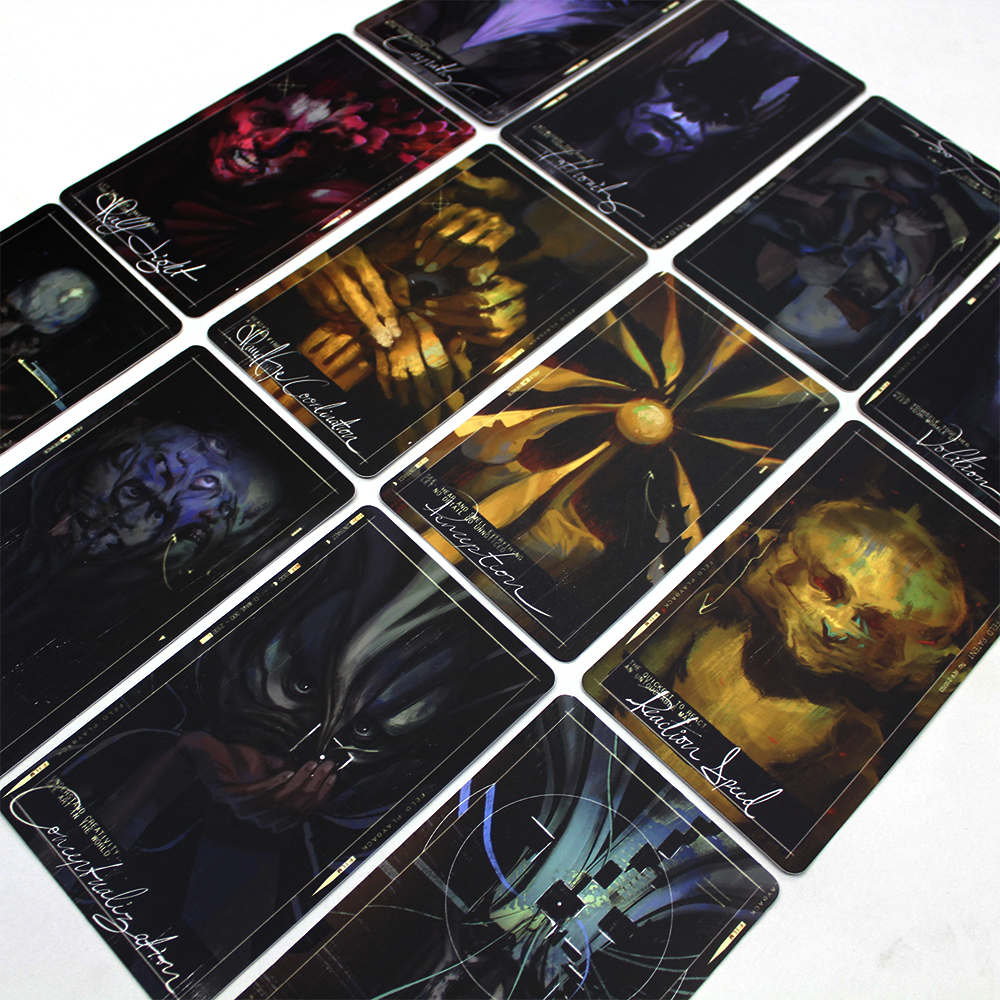
Looks like an improvement overall. Wonder if there's a reason they're still messing around with the designs.


tripedal
Augur
They're dropping some more Kim jackets today if you feel like spending 400 euros on a bomber.
I aint dropping more than 200 on a clothing item.
A bit old, but a cool read. Also, hopefully triggering the old ladies here.
https://www.nme.com/en_au/features/...and-the-importance-of-being-miserable-3139893
https://www.nme.com/en_au/features/...and-the-importance-of-being-miserable-3139893
Sea Power, ‘Disco Elysium’, and the importance of being miserable
“The bloating may never leave your face – but beneath it, you still have some years. You still have some hope”
By Dom Peppiatt
17th January 2022
Rock The Spacebar is a twice-monthly column investigating the great music that underpins your favourite games. This week, Dom Peppiatt explores how British Sea Power‘s soundtrack to Disco Elysium captured all the gloom of hangovers, capitalism, and a man on the brink of losing himself.
Back in 2005, I saw British Sea Power live at a small festival that blossomed in the heart of a Leicester campus every year. The tragically short-lived Summer Sundae was unique in the British festival scene; a favourite of BBC Radio 6 DJs and a destination for all the middle-class hippies that would later move to Totnes or Glastonbury (town), the plucky 6000 capacity festival was a perfect fit for British Sea Power. I was 14 when I saw them perform to a crowd of big-pupiled students, all holding local flora aloft, waving branches back and forth as the set climaxed with the arrival of a member of the crew in a bear suit, running amok onstage.
Even in the mid-00s, British Sea Power was somewhat ahead of the curve. The band was writing music about the slow, perilous collapse of the planet as ice shelves slid into the ocean. It was penning beautiful, atmospheric tracks about obscure bodies of water in Orkney. It was extolling the virtues of being an EU citizen. British Sea Power – or Sea Power now, dropping the nation prefix, so as not to come off all jingoistic – has always been a band that embraces the miserable alongside the beautiful. A perfect fit for Disco Elysium, then.
There have been many established artists that have gone on to make music for games (these days, it’s a pretty damn cool thing to do). But none have fit the brief better than Sea Power. The game – wrenched from the mind Robert Kurvitz, lead designer and writer at pan-European development outfit ZA/UM – focuses on an alcoholic detective embroiled in one of the messiest murder cases you’ll see in media. Junkie kids, racist dockworkers, neo-liberal snobs and venture capitalists that are so rich their wealth bends light around them are all par for the course in Disco Elysium. The setting of Martinaise – a working class district of a fictional post-failed Revolutionary state in a world that’s long past its prime – reeks of despair. Local workers, destitute and stuck in this forgotten town, snatch moments of chemically-enhanced fun where they can get it, before the long winters and salty air call them back to consciousness. And back to work.
I’m willing to bet, even if you’d never played the game, you’d catch a whiff of this oppressive – yet achingly beautiful – world from the game’s OST. Sometimes meandering and melancholic, sometimes pent up with an unsettling menace, the orchestral swells and post-rock inspirations on Sea Power’s work on Disco Elysium is staggering. It’s no surprise the OST won a BAFTA.
But why does Sea Power’s gloomy ode to the faded glory of Martinaise work so well? What is it about this sonic companion to a man wandering to the brink of madness and back that keeps me going back to my record player to spin the OST, sleeve to sleeve? It might be in how the band approached the brief. Per the band’s bass guitarist and vocalist, Hamilton Wilkinson, the group basically ‘lived in someone else’s head’ when writing the music for the game, detaching themselves from Sea Power – with all their experiences of growing up and living in Britain – and instead going all ‘Christian Bale’ on us and getting a bit method.
As a result, we get long, moping tracks that dwell in misery. The second you boot up the game, your main character – so hungover he can’t even recall his own name – experiences an existential crisis so profound it’d make Nietzsche blush. Somehow, Sea Power knows exactly what this would sound like (self-pitying, wallowing, goopy) and you don’t even question it. “Yep, that’s the sound of a hangover,” you nod glumly, picking the responses you want to give to your body to rouse it from its inebriated slumber.
A lot of the soundtrack’s beauty comes from its insistence on repetition. Your struggling cop and his interminably loyal companion – the inspirational Kim Kitsuragi – bumble around the chilly coastal town, revisiting multiple areas often at different times of the day. Sea Power worked in motifs and themes that match location and time, so even though you may wander through to a new area, hangovers of the previous zone stick around in your mind and cling onto your ears. Sometimes, it’s beautiful. Often, it’s unsettling – like a bad feeling you can’t shake.
This is misery. This is what it feels like to be burned-out, peering out over the fringes of reality. It’s all very cinematic, and these morose yet insistent tracks marry with the painterly art direction of the game effortlessly to reinforce this hazy, post-fugue atmosphere that’s so dense in Disco Elysium you could bottle it. Then drink it, probably. And that’s no accident; Sea Power drew on inspirations from composers that worked with David Lynch and Kubrick when making this soundtrack, playing with noise as much as instrumentation to make a sonic landscape that just gets in your head. Paired with Kurvitz’ 1million+ in-game words, the end result is a game that’s as impactful and persistent and frankly upsetting as any Kafka or Beckett.
Many games have tried to get misery right; some go hard on overbearing horror and violent masochism (Bloodborne), some spend 50 hours focusing on a self-pitying emo (Final Fantasy 8), and some make us take a long, hard look at ourselves and ask whether we like what we see (To The Moon). But none hit the nail on the head of existential dread better than Disco Elysium. And no-one felt it better than Sea Power.
2 years and 3 months after I've finally started my second playthrough.
And this is awesome.
And this is awesome.
vota DC
Augur
- Joined
- Aug 23, 2016
- Messages
- 2,320
Please save Prime Junta/René Arnoux and restore the monarchy.2 years and 3 months after I've finally started my second playthrough.
And this is awesome.
fantadomat
Arcane



Can you do it,i never found a way to save the chap. At least i got him some do or die spirit,true man for sure.save René
When the analysis starts name-dropping Jacques Derrida and his concepts, you know this is a review written by the game's target audience of overeducated hipsters:
https://honisoit.com/2021/11/disco-elysium-ghosts-of-a-lost-future/
https://honisoit.com/2021/11/disco-elysium-ghosts-of-a-lost-future/
Disco Elysium: ghosts of a lost future
Boogying down with capitalist realism.
As someone who isn’t really interested in point and click adventures, Robert Kurvitz’s role-playing/mystery hybrid game Disco Elysium was strangely alluring at a first glance.
Even before you can make sense of your surroundings, the game instantly plunges you into a murky black screen, complemented by a jarring monologue. Two voices nag at you, reminding you of your unconsciousness before you wake up hungover and in an unfamiliar room. As you limp forth, clothed in whatever discarded items you can find, you hear from one of the apartment residents about the remnants of a lost disco culture, virtually analogous to our high-flying 70s metropolis. Citizens of the post-revolutionary city Revachol speak reverently of the vibrant, hyperreal disco days of the past. To them, it is a point of fleeting nostalgia. Your character, however, is permanently trapped in the disco days of your youth, face temporarily frozen in a sickly-looking “Expression”.
Kurvitz and the development team at ZA/UM explore an untapped niche of rich dialogue, vivid storytelling and gritty worldbuilding. The ‘disco’ of Disco Elysium doesn’t just connote music and dance but extends to something so much more. Boundless possibilities of lost futures and ecstatic youth have the potential to materialise through the inner workings of your mind. Different pieces of thought provoke choices of dialogue: choices which matter and create thoughts in your mind which you can choose to ‘internalise’ and influence dialogue later on. “Mazovian socio-economics” and “Inexplicable Feminist Agenda” are just some that harken to (and satirise) the fragmented politics of the 21st century, following the collapse of ‘Actually Existing Socialist’ states and a new global world order headed by explicitly moralist global institutions.
Eventually you encounter a government bureaucrat who speaks only in catchwords – it is as if he is not really listening to you but reaffirming the righteousness of the international moralist project, synonymous to the “practical” and “reasonable” ideologues of the United Nations:
“It’s pragmatic, realistic and level-headed, an ideology for ‘doers’.”
And in another, strikingly ironic line, the bureaucrat asserts:
“Because moralists believe in a normal, stable world governed by democratic values.”
On the other hand, the young street artist Cindy the Skull is fiercely antagonistic towards the Revachol Citizen’s Militia (the local police force) and derides them as piggies. Meanwhile, Cuno is a foul-mouthed ten-year-old and a victim of domestic violence who regularly ingests speed and magnesium to elude his morbid reality.
Rather than optimism for socially responsible governance and economic sensibility maintained by the Coalition, there is a somewhat dispirited air in Revachol. Streets are lined with bottles and bags, while the youth find an escape in graffiti and substance abuse. The ambient, sometimes eerie diegetic music in hotels and shops betrays the clear indifference that citizens hold to yourself or their own environment. In other words, Disco Elysium captures the essence of Mark Fisher’s capitalist realism perfectly. The failure of the Revolution has rendered the possibility of any viable alternative to the existing hegemony null.
Fisher writes of the ‘reflexive impotence’ experienced by British students in acknowledging that “things are bad, but, more than that, they know they can’t do anything about it.” The atomisation of mental health and privatisation of these issues within individual neurology rules out any systemic, socially induced cause of depression or mental illness. His statement poses eerie parallels with the neoliberal unipolarity of Disco Elysium. Youth like Cuno and Cindy are on the streets because they have been rejected by a status quo that inculcates and consistently reaffirms the lack of any political alternative. Rather, they are shunned as outcasts, delinquents who are part of the distasteful scenery.
Much of the symbolic value in Disco Elysium is acutely captured by Jacques Derrida’s concept of hauntology – roughly defined as the persistence of elements returning from the past, reminding of a future that failed to happen. Derrida outlines that the hauntological presence of the “spectres of our past” are manifestations of figures that are neither present nor absent, and neither dead nor alive. The protagonist is constantly plagued by this almost bipolar sense of reality – on one hand, he is the optimistic, charismatic disco star of the Golden Age and on the other he is a depressed, alcoholic cop who remembers little about his murky past or police work.
At its core, Disco Elysium doesn’t simply lament the death of the future and the ghosts of the present. It raises a sort of psychedelic consciousness – not just the type of consciousness induced by hallucinogens but an awareness of the liberatory faculties of art, music and theatre as psychedelic experiences that change how we think about our place in the world, outside the confines of hegemony and repression.
For all that we mourn it, Disco isn’t dead – at least not in the realm of the creative.
- Joined
- Jan 28, 2011
- Messages
- 99,677















This is the only overeducated hipster analysis of Disco Elysium you need to read: https://alastairhadden.medium.com/a...-elysium-on-the-past-and-present-e2fff5d629be
A Storm Is Blowing from Paradise: Disco Elysium on the Past and Present
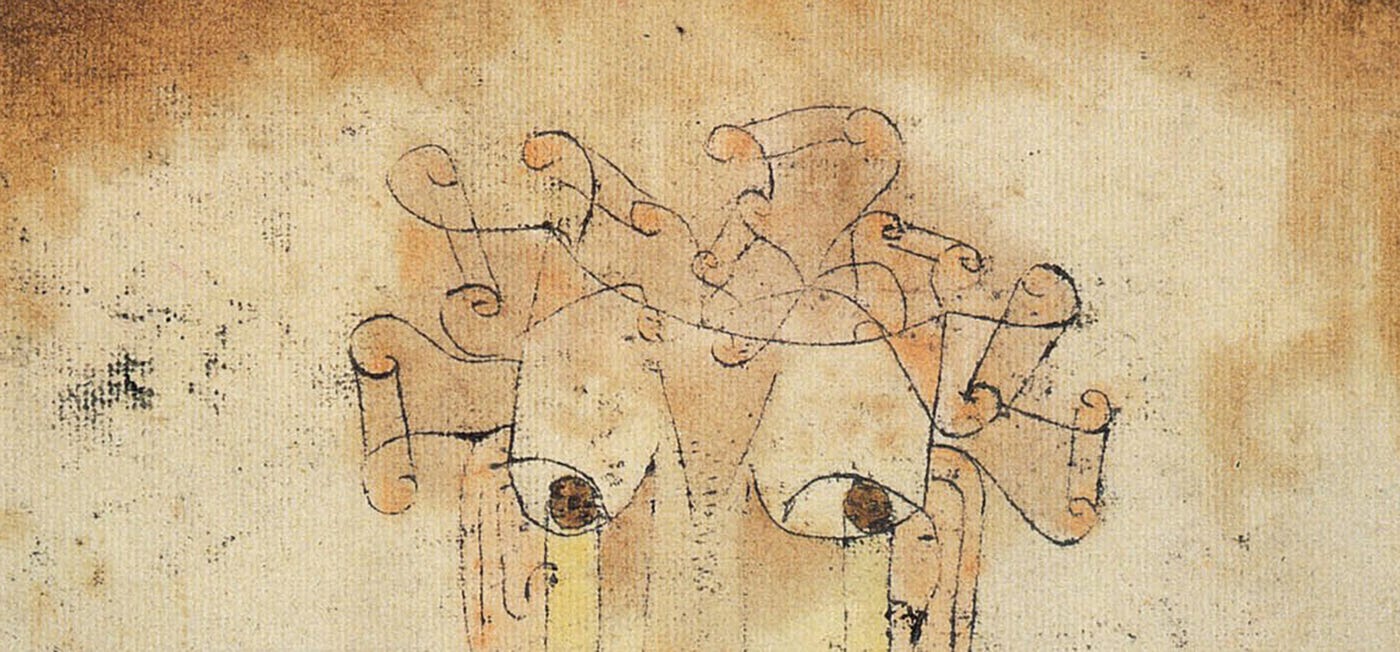
1. The White Flag
What should we make of our past?
The first embodied person we meet in Disco Elysium tells us she has overheard our character, Harry Du Bois, shrieking that he doesn’t “want to live as this kind of animal anymore.” The line is played for laughs, but there’s black ice underfoot. What kind of animal is Harry, anyway? A human. What is essential about humans, asks Disco Elysium—as compared to seagulls or giraffes or Insulindian phasmids?
Part of an answer might be that they can reflect on the past, write biography. And we know that humans are ideological creatures: we internalize theories of history and society, including scientific communism, Revacholian nationalism, and moralism (that is, radical centrism). Another answer is that humans are uniquely capable of abstract thought, of counterfactuals. We can look in the mirror and reconcile with—or reject—what we find there. We can imagine states of being other than our present.
What if we became a different kind of animal? Harry’s half-death and resurrection, which begins the game, is the fulfillment of that wish. He finds himself purged of biographical and ideological baggage, unmoored from memory and hurt. Briefly, he doesn’t even think. All it takes is a remarkable act of self-abnegation, hurried along by drink, drugs, and possible exposure to a hole in the world. “Total retrograde amnesia” may be a worn-out trope, but it’s a working stage door into the world of Elysium.
It’s also impossible to sustain. Our pasts selves aren’t just kept in our heads, after all; they can be detected in our environment and in others. Within moments of Harry’s mysterious rebirth, we’re on the case. We deduce that he’s trashed his hostel room. That he’s a reeking alcoholic, a mess. We can even confront his mirrored reflection—the “clearest water” of the game’s epigraph—and begin trying to comprehend or change what we find there. Once we leave the room, we learn that svelte and sympathetic Klaasje has met us before. Hers is the first of many dialogues that help us retrace our steps: H.D.B. is a police detective who loves disco music, it emerges. He breaks shit and howls in the night. Already, our new, rarefied form is being weighed down with stones out of the past.
Disco Elysium, like Planescape: Torment before it, delights in telling us about the damage our character did before we got there. The broken skua, the lost gun, the crashed motorcarriage . . . Harrier Du Bois has littered the district of Martinaise with clues to his former self. The player will inevitably start sifting through this wreckage, despite the warnings of Harry’s fractured mind—and especially of “Inland Empire,” the game’s most insightful and least practical skill.
But while we can uncover his past, we cannot change it. We have no choice in our character’s miserable biography. To escape the first room, we have to drag on Harry’s “piss-soaked, cum-stained party pants,” and we’re forever stuck in his rundown body. Everywhere we go, we learn of his ruinous past behavior—often to comic effect, always through a veil of guilt and sadness. The past is never finished with us, Disco Elysium says. We can’t drown it or pawn it or hurl it out the window. A human can be without their past only temporarily, like a beach before the tide rushes back.
There are still choices to be made in the present, though. “Life gets hard, but we go on,” as Klaasje sings. Like every CRPG before it, Disco Elysium contends that its player-character can improve with experience. Games are inherently optimistic this way: by accepting tasks and completing them, we tend to become more capable. There’s room to reshape ourselves, too; we can build ourselves better than the next cop, given time and effort and deliberation. That said, one of the game’s few middle fingers to the lineage of Dungeons & Dragons is its notion that a skill can be too developed; a detective can be too smart for their own good, too sensitive, too tough. And it’s noteworthy that almost all of the game’s Thought Cabinet projects and clothing bonuses come with debuffs and drawbacks, too. This world is complex, compromised.
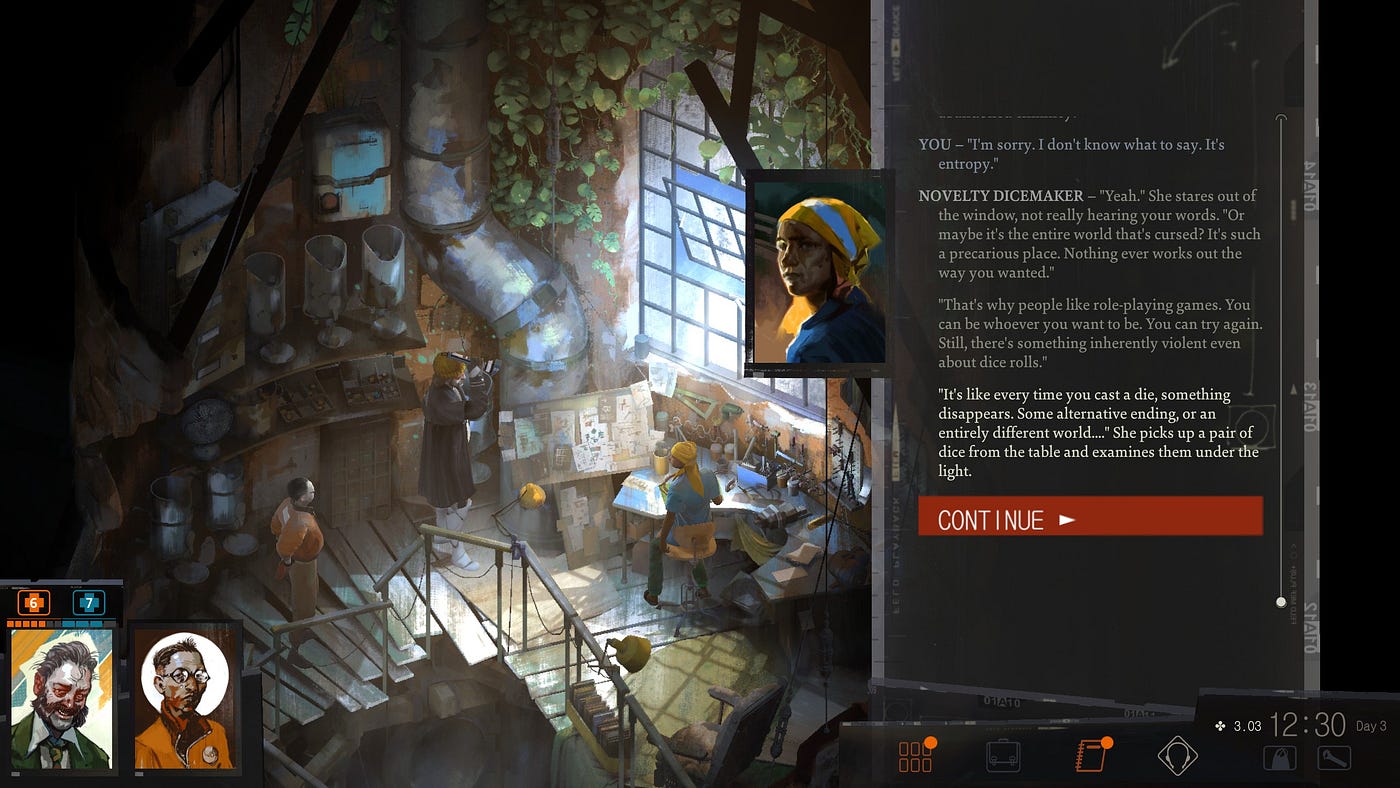
Yet we can still be better than our beginnings. Robert Kurvitz, the game’s lead designer and writer, has said that Disco Elysium is about “reapplying for your job as a human being and as a cop.” This implies a test, a watching authority; someone or something will judge our fitness for both those roles. The reapplication process may prove grueling. Meanwhile, the past will return to us on every street corner in Martinaise. We will never get the drop on it or be done with it. We can only reassess our old choices and make better ones. In mechanical terms, this reduces to decisions about where to go, what to say, and how to think. Along the way, we tinker with Harry’s impulses and beliefs, and even introduce him to new concepts as we stumble across them.
At first, the game’s attitude to all this appears cynical. In the opening hours of Disco Elysium, Harry Du Bois is an ideological magpie, lining his nest with leftover scraps of political theory. His ideas are frail and worn-out things, and the game heaps derision upon them. Disco Elysium appears to have little time for hermetic ideology. Its political digs, early on, are things any Twitter user—or worse, any South Park viewer—might recognize. A drowning man may grasp at these straws, the game seems to scoff, but they won’t save him.
There’s real danger in this: by mocking communist and fascist impulses equally, the game risks sliding into a morass. Make no mistake, though: Disco Elysium is earnest and loving. Its heart, slowly revealed, pumps without irony. Also to its credit: it never permits its players an Archimedean point. Some of the game’s fiercest scorn is reserved for mealy-mouthed centrism or the “Boring Cop” who won’t commit. Neutral ground is still territory, this game knows, and there’s no safe vantage for laughter. As the hanged man tells us, there’s nothing funny about jokes.
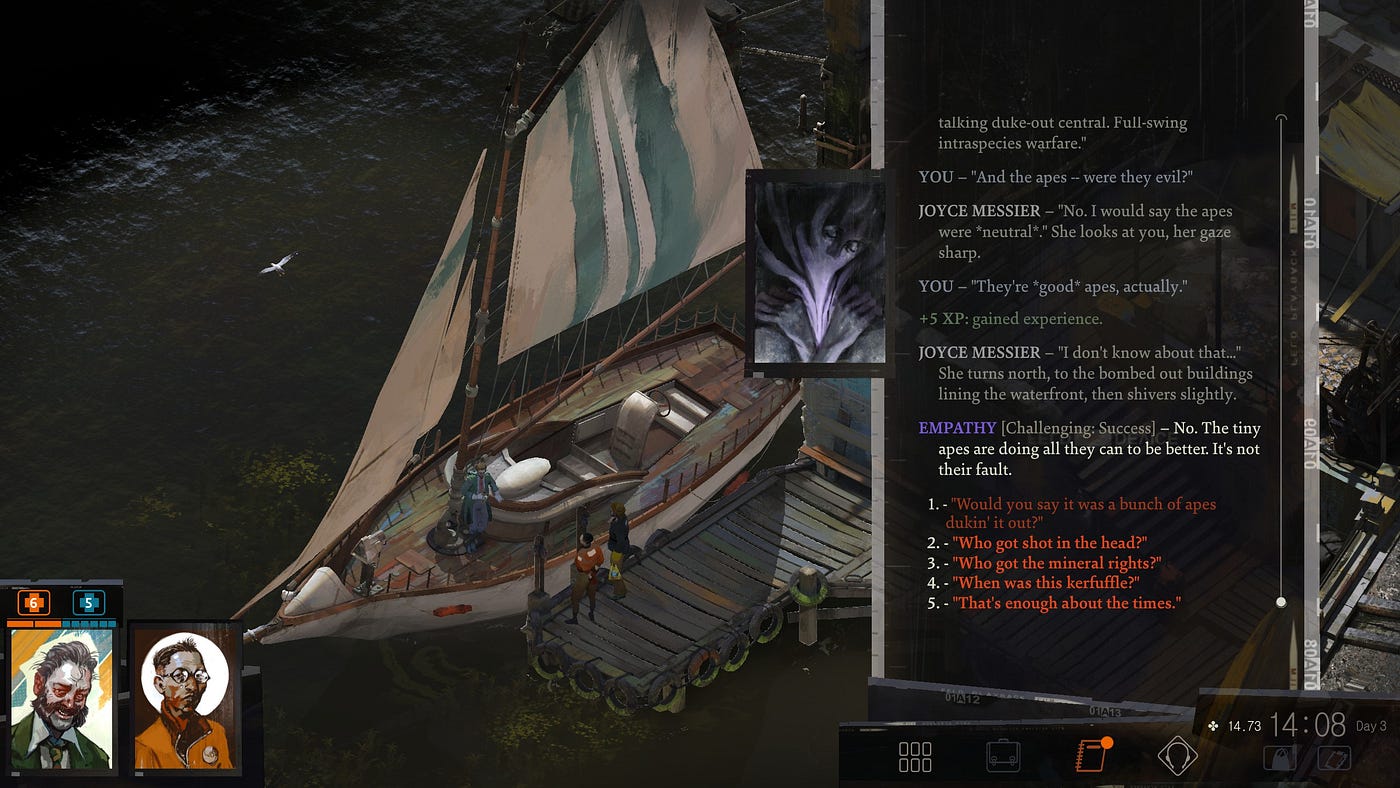
But what is this place we’re policing? And what’s at stake? Just as Harry is waking up, his limbic system offers another theory of the human animal: we’re “evil apes dukin’ it out on a giant ball.” All we do is vie for resources, our brain laments; we have to beat the other apes or we lose. Is this Hobbesian vision true? The people we meet in Martinaise, their histories and hopes, should convince us otherwise. Even the Insulindian phasmid defers judgement on the flitting, open-hearted humans it has observed—despite its knowledge that they may be the cause of Elysium’s long, slow surrender to a phenomenon known as “the pale.”
By nudging Harry’s thoughts and actions, we can work toward refuting the limbic system’s paranoid assessment. Even in the game’s opening moments, we are given the option to think that the giant ball and its small, squabbling apes—this state of being—is sad, actually. We may not be able to alter Harry’s past, his human nature, but the individual player can choose how they feel about these things. A person could be more than an evil ape, we can argue. As Joyce Messier later remarks, “Even animals aren’t animals.”
And is this giant ball we share even a ball?
2. The Gorgeous Undertow
On the first night of his second life, Harry Du Bois dreams of the crime scene behind the Whirling-in-Rags. Within the dream, he can ask his hanged self a vital question: “What is Elysium?”
“Everything,” the Bloated Corpse of a Drunk replies. “The pale and the isolas … Burning, furious truth, eight thousand years of written history.”
We hear the same story about the world from Joyce, a member of the moneyed elite and the chief supplier of Harry’s “reality lowdown.” When pushed, Joyce reveals that Elysium may not be strictly spherical. A trickle of images from orbit suggest “a dark grey corona.” The pale, a featureless phenomenon that resists description, covers almost three-quarters of the world’s surface:
“There are grey flares and prominences, even arcs above entire isolas . . . The images are blurry, but if there was a sphere in there it certainly looks like it fractured a long time ago. . . . They say there is a rarefied envelope of matter surrounding the darkened disc of our planet. That is, if we are still living on a planet.”
The pale, it emerges, is an existential threat to the ecumene of Disco Elysium; it is growing, year by year, to swallow the known world and everyone in it. The isolas—little outposts of matter amid the pale, where humans dwell—are shrinking. There are perhaps three decades until everything that lives is pale and gone. Until then, humankind is but an “opportunistic microorganism” scattered across the pale, beaming its lights out into the void. Easier to picture Elysium as a disco ball than Carl Sagan’s blue dot.
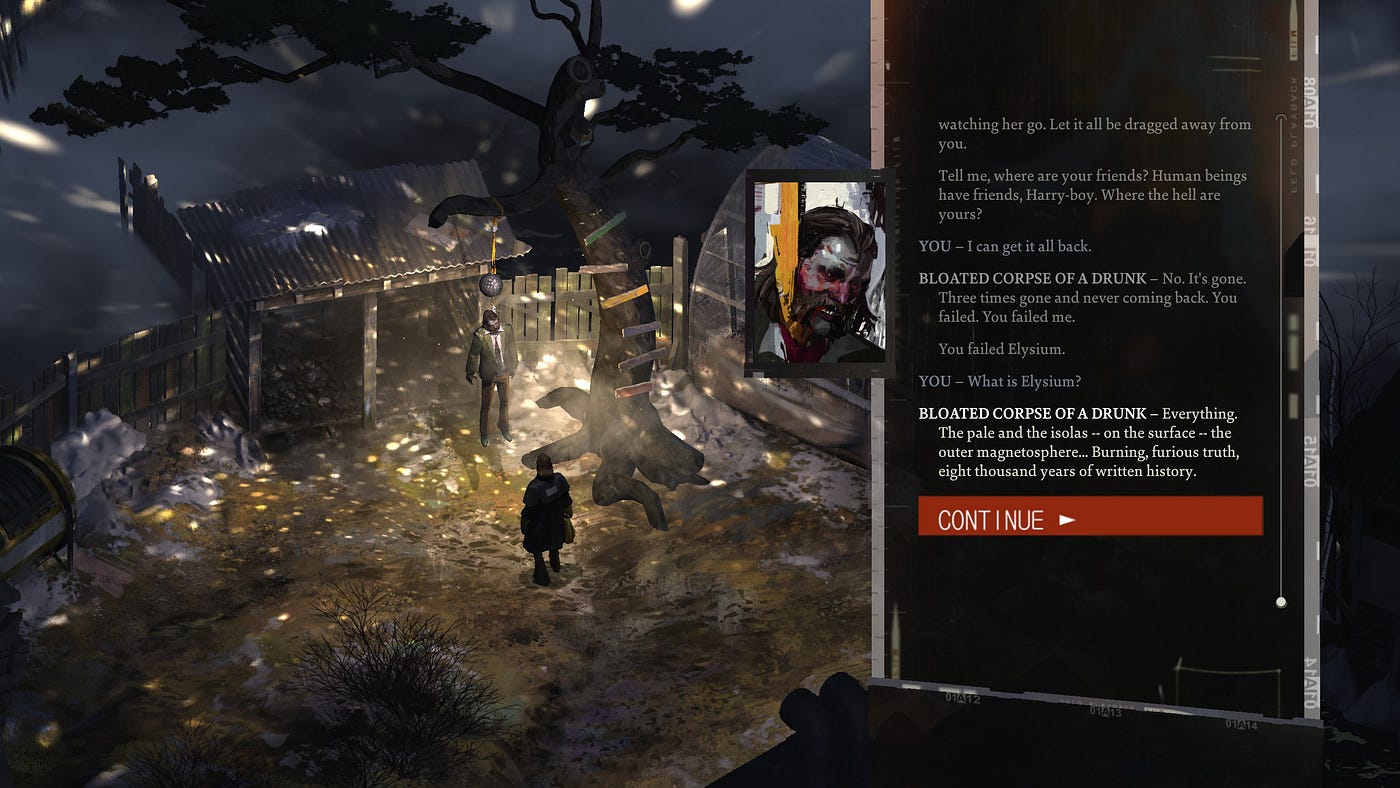
So why is the wider world not panicked by this looming calamity? Everyone we meet in Martinaise seems defeated, hopelessly inured to the logic of late-stage capitalism. Shouldn’t the heaped corporate wealth be directed toward mitigation strategies, toward human survival? Why does the truth of the coming pale not “jolt us out of our rut,” as Joyce herself asks? No one knows.
One live debate, we are told, is between Elysium’s logical positivists—who believe the pale harms us through “extreme sensory deprivation”—and its dialectical materialists, who argue that the pale “somehow *consists* [sic] of past information . . . That it’s rarefied past, not rarefied matter.” Any humans exposed to it, on this view, become “over-radiated by past.”
What does this mean? Whom should we believe, and where does it leave us? Another kind of animal, the Insulindian phasmid, unpicks the thread at the game’s end, when we manage to communicate with it:
“[The pale] is a nervous shadow cast into the world by you, eating away at reality. A great, unnatural territory. Its advent coincides with the arrival of the human mind.”
The pale showed up when we did—in light of which, Kurvitz’s introduction to the setting becomes more pointed: “It has been there for as long as human beings have written down history.” The pale is a human creation, an excretion of the human animal. The phasmid tells us that no other species remembers it existing before we rose to supremacy. While Disco Elysium never offers a definitive account of the pale and its causes, you might call it the accumulated weight of our human past. Our tidal wave of history, rolling back to shore.
Is there any hope for us? Aesthetically, maybe. We can admire the collapse, furnish it. In the later parts of the game, the player can spend hours of their time on a series of interrelated tasks at an abandoned church, one of the “Seven Sisters” built by early settlers. These tasks have us convert the space into a nightclub for a new kind of dance music. The quest starts out feeling tangential, but it culminates in a series of discoveries that are thematically and emotionally vital.
Short version: there are multiple holes in the universe, 2 millimeters in size, and the Seven Sisters were built to house or contain them; these holes are related to the relentless production of pale; one of these holes may have factored into Harry’s amnesia; the “swallow” or un-sound produced by the holes proves an essential feature of Revachol’s emerging anodic (electronic) dance culture; and Harry can commune with the city by boogieing out of his mind. (Revachol beams him a warning. It tells him he is loved.)
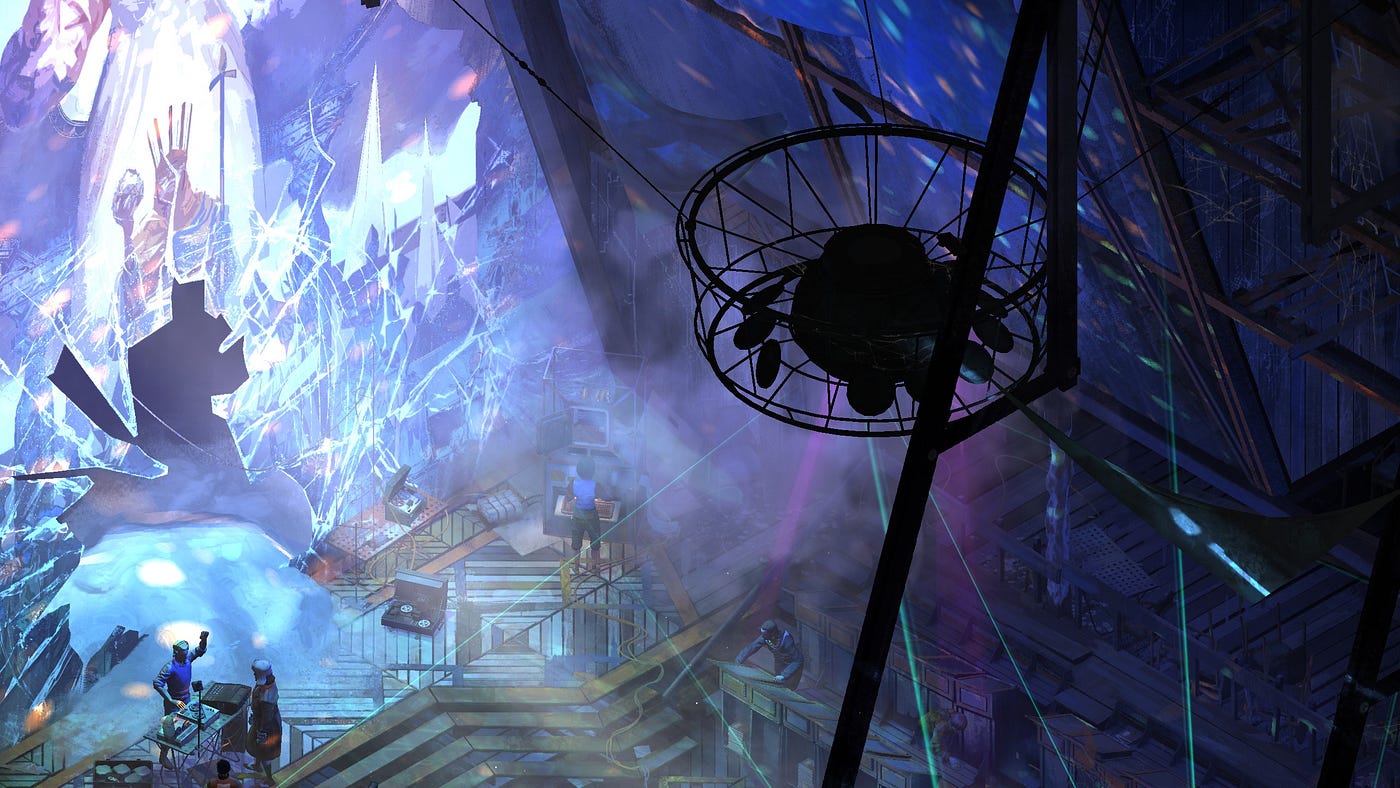
Some of the game’s most staggering worldbuilding is staged in this little church; it is here we witness the synthesis of Elysium’s spiritual, scientific, artistic, and “para-natural” aspects. Note how Soona, the failed programmer, finally locates the 2mm hole: she surrounds it with its opposite, its antipode. She floods in loud, live, human music. And not just any music: noisy, urgent rave. Youth music. If there is too much past to bear, Disco Elysium seems to say, if the old world is leaking, plug it with the new.
Outside, the world is 72% pale, and the ratio is worsening. There is more and more of the stuff each day, growing skyward. A rising tide of past, crashing ceaselessly into our present, threatening to wash us away. Yet a beach still describes the ocean, even as it is consumed by it. And Harry Du Bois provides a living analog of this—its human proof. He cannot run from his past, but he can dance with it.
He can make something of it, with the player’s help.
3. Whodunnit?
Who killed the hanged man?
Disco Elysium calls itself “A Detective RPG,” and it offers big, heady swigs from classic detective media. Harry is the battered old cop obsessed with one last case; Kim is his faithful partner and confidante, the foil. Klaasje is the femme fatale out to save her own skin. And the city itself is a character—all evening shadows and icy breezes, littered clues and ticking clocks.
But the game also picks at the seams of old genre fiction, of the familiar. The world is surprisingly colorful and spirited, rich with culture. Martinaise may feels mournful, but it’s never a vise. And the corpse behind the Whirling-in-Rags isn’t the usual blonde angel of pulp—an unavailable object left to inspire the priapic male detective. Instead, it’s the scarred, rotting meat of a man who’s been dead for a week. It emerges that the body belongs to Ellis “Lely” Kortenaer, a strike-breaking mercenary who once reveled in the rape and pillage of far-off colonies.
Even animals like Lely deserve justice, holds Disco Elysium. And if not justice, our attention and care. The cops of the Revachol Citizens Militia (RCM) may be depicted as little more than overworked civil servants, but they’re not unmoved by their purpose. Corrupt and cynical, maybe, but not heartless. It’s a view of policing that may be jarring to anyone reared in a culture where cops are understood to be murderous enforcers of the status quo—and lionized in that role. But Revachol is a city in which violence, including state violence, is largely implicit. The police in Jamrock and Martinaise are neutered politically and carry impotent, muzzleloading firearms. The function of the RCM, Kim notes, is almost janitorial; they spend much of their time tidying up messes, ignoring minor offenses, and negotiating the peace.
All of which is essential to understanding the game’s view of police work: there is dignity in it — when it’s done with patience and empathy—but no heroism. Contrast this with conventional detective fiction, in which the identity of a corpse and its killer are reduced to intrinsically thrilling puzzles for a person of genius to solve. Most famous literary detectives eschew the political, emotional, and social aspects of a given crime, unless those aspects offer pertinent clues. Yet Harry and Kim are quick to relate to the citizens they police, because nothing would get done without their cooperation. Even the most bullying, reckless version of Harry Du Bois spends most of his time talking to people and trying, misguidedly, to help.
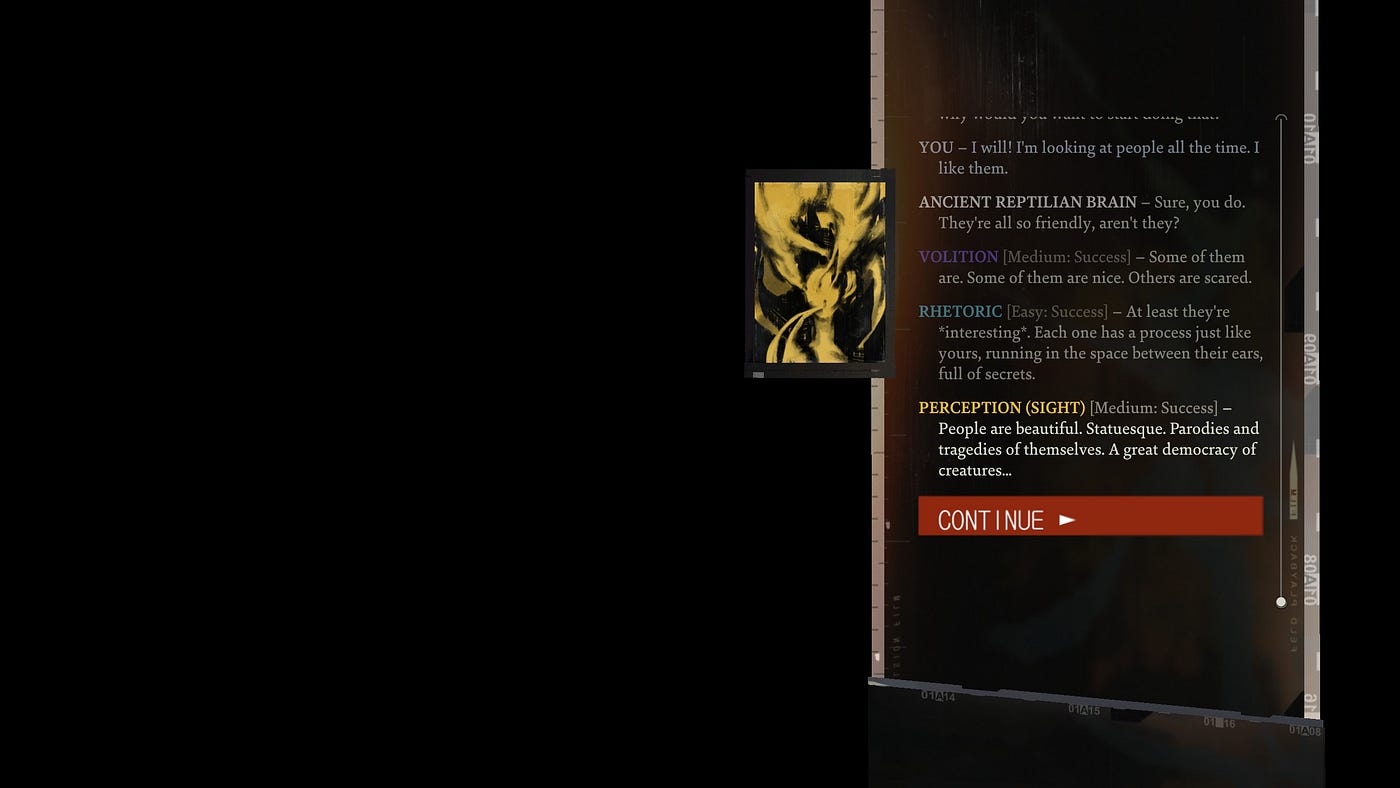
Other fictional detectives—Philip Marlowe, the Continental Op, Dick Mullen—serve as cleansing agents. They disinfect a given wound and restore the world to order, even if that order is lamentable. Harry Du Bois, by contrast, is an active contaminant, a man with no memory who queries everything, by necessity, and drags the whole world under his lens. Martinaise, all of it, becomes the object of his investigation. And while Harry’s methods are madcap, his curiosity is infectious; just ask Kim Kitsuragi. Or Kuuno de Ruyter.
“THE HANGED MAN,” as Lely’s murder is named in Harry’s ledger, is not the first or even principal mystery of Disco Elysium, but for many players it’s the main draw, and they are disappointed when Lely’s killer is revealed to be someone that Harry has never met. Iosef Lilianovich Dros, the elderly communist deserter who shot Lely prior to his hanging, doesn’t appear until the game’s denouement. This, many argue, is unfair to players doing their own detective work at home; it breaks the established rules of the genre. But what are those rules, exactly? And does Disco Elysium even give a shit?
Nearly a century ago, one version of the “rules” was enshrined by Ronald Knox, one of the authors of detective fiction’s so-called Golden Age. Knox’s first and cardinal rule affirms many players’ dislike for the ending of Disco Elysium: “The criminal must be someone mentioned in the early part of the story, but must not be anyone whose thoughts the reader has been allowed to follow.” If the criminal has never been in sight, the thinking goes, their unmasking won’t satisfy.
But what else does Knox demand?
“2. All supernatural or preternatural agencies are ruled out as a matter of course.”
Disco Elysium is stuffed with contrivances and unreal technology, but let’s stick to things that are weird even for the denizens of its world—and leave aside the pale and the 2-millimeter hole. The Deserter has hidden out for decades on various islands in the bay north of Martinaise, during which time he has suffered prolonged exposure to the “para-natural” Insulindian phasmid and the mind-altering camouflage it uses to avoid detection. This camouflage, the phasmid concedes sadly, has damaged Iosef’s mind and played its part in the murder.
“3. Not more than one secret room or passage is allowable.”
Count them: there’s the pinball museum in the Whirling-in-Rags; the hidden spaces beneath the Feld Building (including the communist bunker, itself a secret room within a secret passage); the inoperable door on Land’s End that would have brought Harry and Kim to the Sea Fortress; the Doomed Commercial Area lurking behind the bookshop’s curtain; the Dicemaker’s nest in the chimney (another space within a space); Cuno’s shack . . .
“4. No hitherto undiscovered poisons may be used, nor any appliance which will need a long scientific explanation at the end.”
As mentioned above, the phasmid unintentionally subjects the Deserter to an “undiscovered poison,” which Harry can sample (using a high-level Electrochemistry check) as one method for speaking with the creature. But think also of the radio device with which Ruby assaults Harry beneath the Feld Building, normally used to blast channels through the pale.
“5. No Chinaman must figure in the story.”
No, this list hasn’t aged well, even in conttext, and this item offers one of the most winking indicators that Disco Elysium knows the rules it’s breaking. Kim Kitsuragi isn’t a “Chinaman,” of course; he’s a Revacholian of seolite descent. But his centrality to the game’s story feels like a deliberate rebuttal of one of the tropes of Golden Age detective fiction. And if this seems too tenuous a connection, consider the racist “Chinaman” mug Harry finds discarded in the trash.
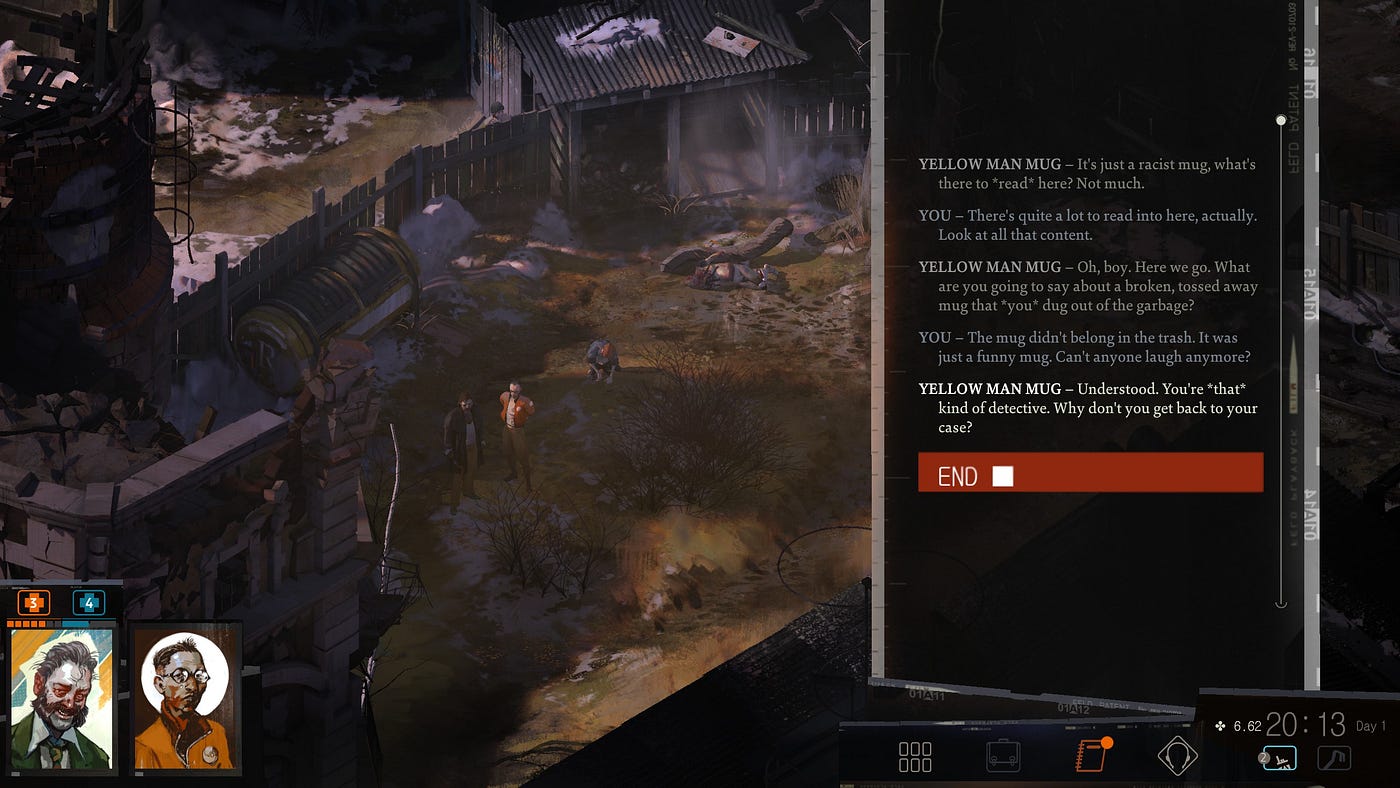
“6. No accident must ever help the detective, nor must he ever have an unaccountable intuition which proves to be right.”
The game delights in breaking this rule; there are simply too many instances to count. Disco Elysium is a storm of happy accidents and unaccountable intuitions, and two of its skills—Inland Empire and Shivers—are all but devoted to giving the player privileged information that later proves true.
“7. The detective must not himself commit the crime.”
This is one rule that goes unbroken. But let’s not forget that the game flirts with the possibility that Harry is a criminal and a killer: Ruby believes, mistakenly, that he is a “peone” for the gangster La Puta Madre, sent to execute her. And as a man without a past, he is also a man without an alibi, at least initially.
“8. The detective must not light on any clues which are not instantly produced for the inspection of the reader.”
Because of its dice-roll mechanics, Disco Elysium permits the player to “light upon”—and then immediately lose access to—important clues. For example, a failed check robs us of the flowers on Klaasje’s roof, the “May bells” that become one of the game’s most telling pieces of evidence. And Harry himself is full of clues not instantly produced; his mind only spits these up when prompted by a relevant situation or dialogue—or when a particular skill is emphasized. This is one respect in which a videogame with branching paths can be more compelling than a linear narrative: Disco Elysium allows us to miss things, or mistake them, or return to them later, and it offers varied routes to the same truth.
“9. The stupid friend of the detective, the Watson, must not conceal any thoughts which pass through his mind; his intelligence must be slightly, but very slightly, below that of the average reader.”
Kim Kitsuragi is far from stupid, and Cuno often shows quicker wits than Harry if he joins the latter for the game’s finale. Both companions routinely withhold their thinking from H.D.B. and the player. High levels of Esprit de Corps, Empathy, Composure, and other skills are required to access their inner states, which means some versions of Harry learn little of what goes through Kim’s or Cuno’s minds.
“10. Twin brothers, and doubles generally, must not appear unless we have been duly prepared for them.”
Edgar and Evrart Claire are (almost) identical twin brothers. Lilienne from the fishing village is mother to twin sons, whom Harry cannot tell apart. And while Ellis and Raul Kortenaer aren’t blood relatives, they grew up together and share the surname given to them by their foster family. Raul’s identity and connection to Lely can remain hidden until the tribunal, if the player does not gain the trust of both Joyce and Klaasje.
There’s a mound of evidence that Disco Elysium goes out of its way to violate Knox’s commandments at every possible opportunity. Its assault on the rules of detective fiction is knowing and deliberate. But what’s the point? Why attack a set of principles designed to produce a pleasing narrative?
Remember that the game has already shown contempt for the tidiness of ideology; it distrusts any rigid frame for viewing or creating the world. Knox’s rules are one such frame, and they don’t jive with the postmodern tradition Disco Elyisum inhabits. Postmodernism asks us to be skeptical about grand narratives, about any “explicable” chain of events that can be traced back—link by link, clue by clue—to a single cause. Knox and his contemporaries lived in a time of prevailing modernism, and they idealized self-contained puzzles that would please the enlightened mind. Disco Elysium, by contrast, depicts a world like our own, dizzying and fractured, in which we are unsure of our ability to make the pieces cohere. Accordingly, it treats the “rules” of genre fiction as artificial, stultifying, and dishonest.
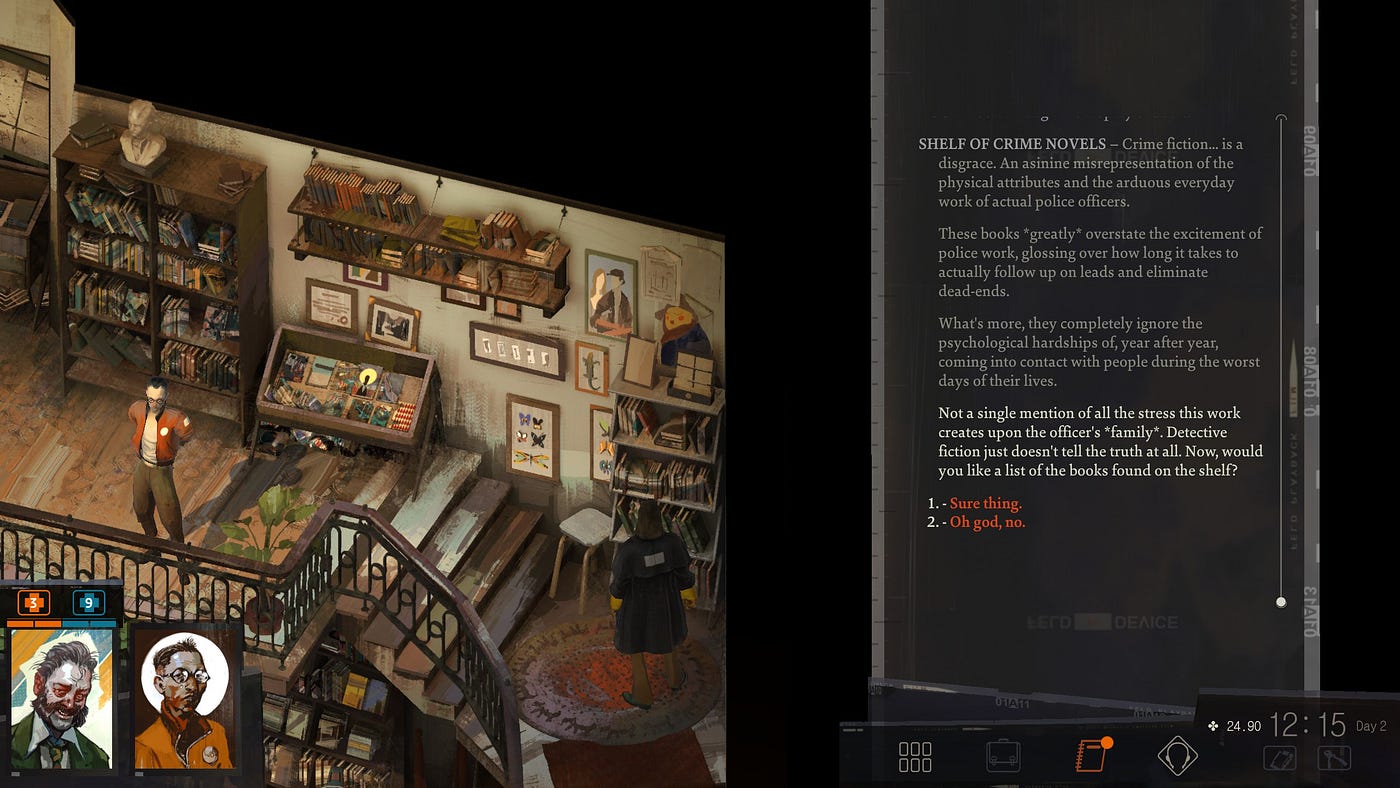
Raymond Chandler might have agreed. In the postwar period, he drafted a new set of commandments for the detective story, and Disco Elyisum hews better to these (except, perhaps, for No. 8: “It must not try to do everything at once.”). In 1950, Chandler dismantled the fussier, rule-following tradition of detective fiction in an essay called “The Simple Art of Murder.” It’s worth reading in its entirety, but here’s a relevant excerpt:
“There is a very simple statement to be made about [Golden Age detective] stories: they do not really come off intellectually as problems, and they do not come off artistically as fiction. They are too contrived, and too little aware of what goes on in the world. They try to be honest, but honesty is an art.”
Disco Elysium is acutely concerned with “what goes on in the world”—and with being radically honest about it. On this view, it is far less important that the player is able to recognize the murderer from the opening moments of the game, and much more important that the murder dramatizes true things about Elysium, about Martinaise. This theme is taken up at much greater length in PJ Judge’s piece, “A Spectre Is Haunting Martinaise.” Of particular note is this quoted passage, from Paul Grimstad’s What Makes Detective Fiction Great:
“At the end of his 1944 essay, Edmund Wilson suggested that it was no accident that the Golden Age of detection coincided with the period between the two World Wars: in a shattered civilization, there was something reassuring about the detective’s ability to link up all the broken fragments and “know just where to fix the guilt.” Such tidy solutions were to Wilson the mark of glib and simplistic genre fiction. But to [T.S.] Eliot, who in “The Waste Land” wrote of the fractured modern world as a ‘heap of broken images,’ it seems possible that Golden Age detective stories offered above all a pleasing orderliness—a way of seeing ghastly disruptions restored to equilibrium with the soothing predictability of ritual.”
Disco Elysium offers no “soothing predictability,” and neither is it glib. Its fractured world, so like our own, is not the setting for a mystery; it’s the subject of it. “Who killed the hanged man?” isn’t the question at stake. It’s the prompt for a broader investigation into what has fractured Martinaise—and fractured it irreparably, such that it cannot be made whole.
On this view, the game becomes what Harry Du Bois calls a “stereo-investigation,” a meta-inquiry into the world and his state of being. The game jokes about Harry treating everything as a puzzle worthy of investigation . . . but there’s nothing funny about jokes. Think of all H.D.B.’s diversions, his side tasks. Where is his paperwork, his badge, his other shoe? What’s behind the blue door in the Whirling-in-Rags? What’s behind the curtain in the bookshop? Who put the racist mug in the trash? Where is the victim’s missing armor? What’s the significance of these strange white flowers? And those are just the smaller ones. Go wider: what shuttered the businesses in Martinaise’s doomed commercial area? What has become of a working-class woman’s missing husband? What ruined the ambitions of a “radiogame” company and led Soona to the church? Is there a mythical cryptid lurking in the reeds?
Kim is skeptical about the importance of many of these questions, but Harry is always proved right that they are relevant or consequential. Even his zaniest tasks turn out to be fruitful, and his journal never imposes a hierarchy or scheme upon them (unlike more traditional RPGs), beyond noting the day they were begun. Every task in Disco Elysium belongs to a singular mystery, it emerges. The case of the amnesiac detective. The case of Martinaise’s neglect. The case of the failed Revolution.
Okay, but who killed the hanged man?
A nobody we never met. Case closed?
Look around: the environment is littered with clues. Outside the Whirling-in-Rags, the terrain itself is ruptured. An unrepentant royalist plays pétanque in a crater, never filled. The scenery is studded with bullet holes, never patched, and Harry, with ironic naivety, wonders if they’re evidence of something. We tour a bombed-out apartment block with pricey ocean views, or we peer through a coin-operated viewer and spot the Deserter’s sunken fortress. Everywhere, Martinaise has failed to resolve its crisis: at the center of the harbor’s traffic jam, a monarchist statue has been restored, by goofing artists, to a half-exploded state. One of the game’s most mournful scenes has Harry visually reconstruct a long-forgotten firing line. Who was doing the shooting is unclear, but Kim suggests it was Coalition troops, who are always the last ones standing. The forces of foreign capital, swooping in to claim their morsel.
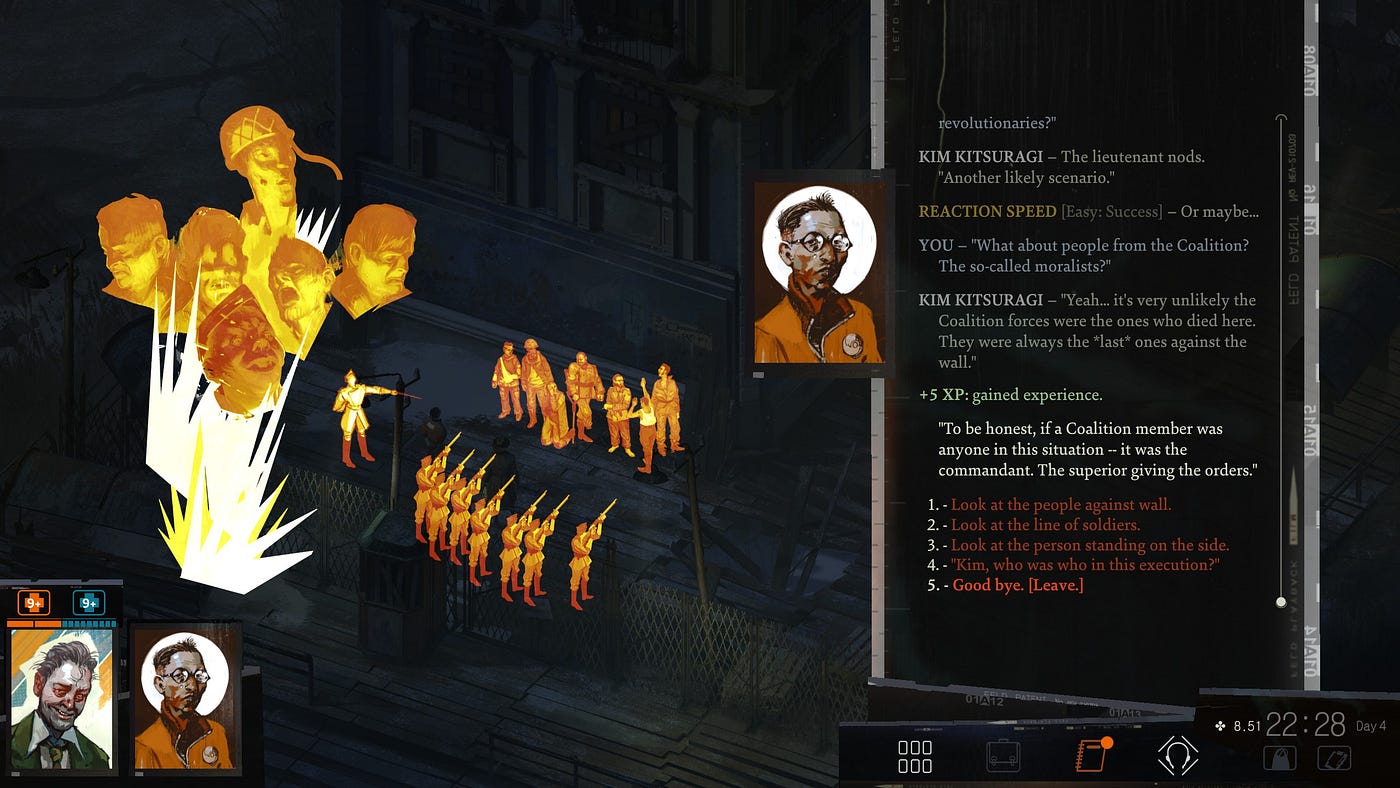
From the opening moments of Disco Elysium, we are repeatedly shown that Martinaise is a wound that won’t heal. Home to drunks and dockworkers, the district has never been absorbed into the wider city, and all attempts to gentrify it have failed. The RCM squabbles over who won’t have to police its streets; the Wild Pines Group needs the place only for its harbor. Everything about Martinaise is wrecked and haunted and wanting. Waiting for a resolution that never came. The bullet that lands in Lely’s mouth arrives decades late.
(During the initial autopsy, Inland Empire allows you to ask the hanged man what killed him. “Communism,” he replies, and we dismiss it. It’s a silly answer. Reductive, unhelpful. It’s also not wrong.)
Disco Elysium is a game in mourning—not for lifeless “scientific communism,” but for the Revachol commune, for what it represented and might have been. For what it was not allowed to be. The grave markers are everywhere, and they leak into Harry’s mind. He can mistake himself for Kraz Mazov, the game’s version of Karl Marx, or convince himself that Mazov never died. He can tangle the feminine spirit of “girl child Revolution” with his own lost love for Dora, an ex-girlfriend who left him six years ago, and whom he’s never gotten over.
In Harry’s addled mind, this isn’t a trite comparison; the Revolution and Dora were both opportunities for hope—joyous uprisings—but they’re gone now, into history. In spite of this, he can’t help sorting through the wreckage. Harry puts a hole in his own head, and still memory comes flooding back.
What makes H.D.B. remarkable, in the player’s hands, is that he still gets up and does his job. He starts afresh. He bears the weight of his past.
Compare him with the members of the game’s twisted love triangle: the Hanged Man, Miss Oranje Disco Dancer, and the Deserter. Those aren’t their real names, but they’re no longer real people. They’re revenants, walking corpses. All three gave their youth to some form of service to state or capital, and it damaged them irreparably. Iosef poured himself into his Revolution; Klaasje and Lely have done heinous things on behalf of the banking sector and their shared country of origin. None of the three can escape what they have done, or continue to do, in the name of ideology.
Lely is a brutish husk who depends on blood money. His only purpose is to inflict order on Martinaise, to “civilize” it as he has civilized Oranje’s colonies. Even a bullet to the head can’t free him from his armor, his layered shell: the bitter spring temperatures preserve his flesh long after death, and Harry can conjure his spirit and speak with it. While Disco Elysium shows a measure of sympathy for the dead colonel—and for the other members of his squad, whom it treats as the damaged claws of capital—it is clear-eyed about how their lives must end. There is no escaping such carnage.
Klaasje, too, cannot outrun her past, even as she tries out new names, new drugs, new sexual partners to cover over her espionage. Martinaise is the end of the road for her, she admits. There is no place her old employers won’t find her. Yet she clings to life out of habit, flees out of habit, smokes and fucks and lies out of habit. Those impulses define her; she can’t make new ones. She is sorry for what she has done, she maintains, yet she knows that isn’t good enough. Her history towers over her, and she can only linger in its shadow, feigning a shrug.
And there’s the Deserter, stranded in the past. He cannot forgive anyone for the failure of the Revolution, least of all himself. He fashions his scrapheap of ideology into ironclad righteousness, all to sustain a pretend guerrilla war—though its casualties, plural, are real. If his vigil ends, the Deserter thinks, so will the future. Yet the future has already been lost. The game invites us to compare Iosef with the right-wing monarchist, Rene: both are furious old men clinging to outmoded politics, to ideals capitalism has dispensed with and stripped for parts. Both refuse to abandon their posts . . . yet no one notices. They might have been friends, it is implied, if they could have recognized each other’s personhood.
Instead, the Deserter sees himself in Klaasje. He spies her arriving in Martinaise and hiding her documents. For a brief moment, he thinks of her as a kindred spirit who has seen the mask of capital slip, as he has. He is bewitched by her solitary flight into Revachol, even as he loathes her for what she represents—and for her sexual embrace of Lely. He murders the latter not just for what he is—a deformed golem—but for what Lely can share with Klaasje, whom Iosef cannot have. She is simply too far away for him to reach, in distance and time and ideology.
The task of the detective, on the conventional view, is to point out an evil and cleanse it. If we can identify “whodunnit,” we can punish the culprit and make things right. But there is nothing to be done with Iosef, an angry old man who murdered a stunted ogre on behalf of a sad and unavailable woman. Disco Elysium cares about all three of them as people, but it’s not clear things could have gone otherwise.
History wouldn’t allow it.
Let’s be honest: the simple fact of the Deserter’s identity isn’t valued in the story of Martinaise, and neither is the player’s vanity in deducing it. This place was shattered decades earlier, and the Deserter’s act is just one more sad beat of its dying heart. Lely’s murder isn’t a mystery to be solved; it’s a tragedy to be understood—and mourned. It deserves as much consideration as the death of the working-class drunk who slipped and died on the boardwalk. Which is to say, all the consideration we can muster.
That’s Harry’s job, in the end, and ours. To stare into the past and ask what happened. To determine how we should feel about it. Because of his amnesia, H.D.B. is the only person in Martinaise who can approach the world anew, encounter it with fresh eyes. The world is radically available to him; he can pick up any of its pieces and begin rebuilding communism, or spouting fascism, or affirming the “ultraliberal” hustle. If we choose, he can even pursue a ragged, loving humanism.
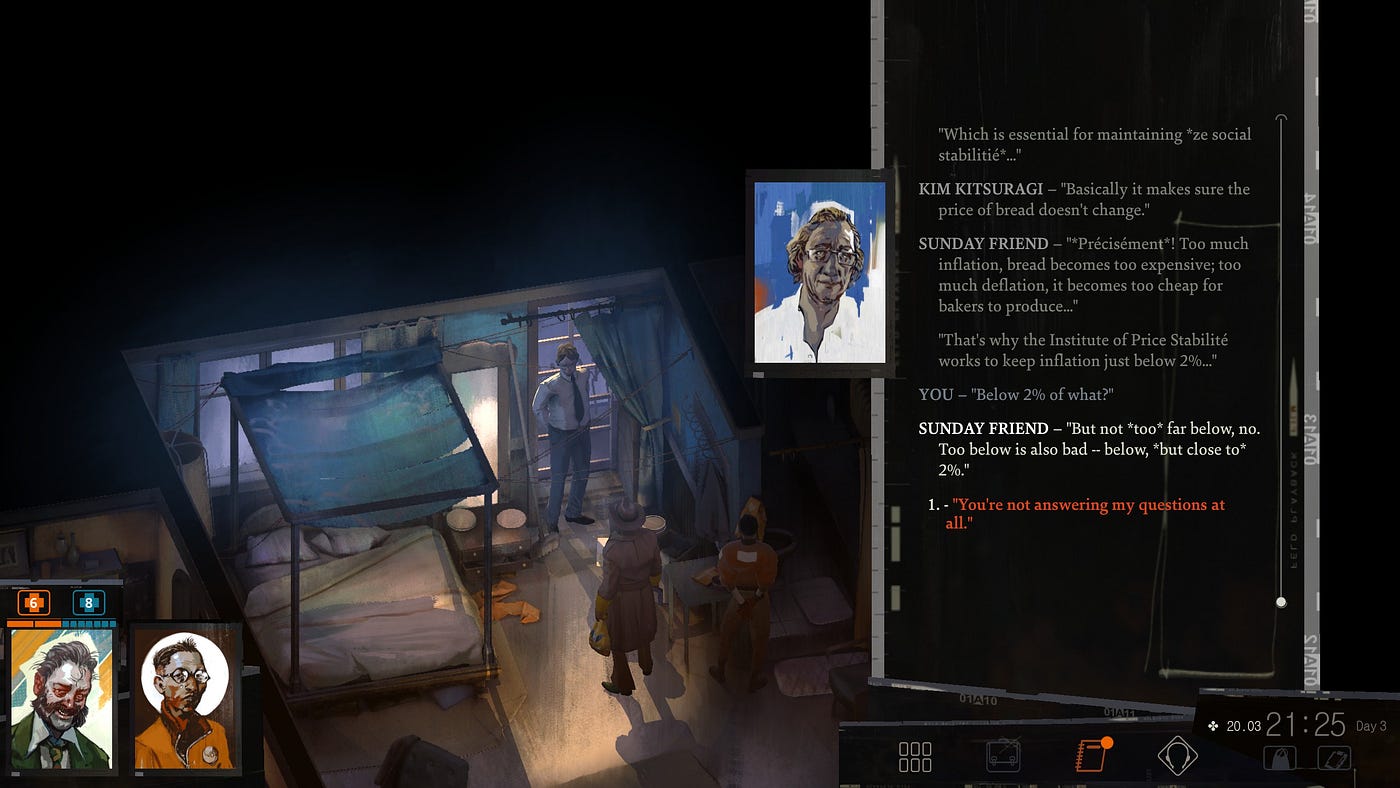
Yet Disco Elysium treats ideology as a form of dementia: Joyce jokes about the pandemic that provided the material conditions for the Revolution, and if we play Harry as a devout Revacholian nationalist, all but two minor characters will treat his outbursts as they would a madman’s. Mechanically, the game treats fascism as a kind of psychological self-harm: it hurts our morale to pursue it. That’s a wishful indulgence, perhaps, similar to Kurvitz’s declaration that slavery has never existed in this world; even Disco Elysium, a radically honest project, is not without its evasions. But the game is bluntly truthful about a society, like ours, where capitalism has won an almost total victory, and in doing so “ended history.” Capitalist logic is unassailable, if we forget the encroaching pale.
It’s sad to admit, but even Harry’s leftist politics are flimsy. They don’t stand up to scrutiny, let alone the prevailing world order. They also don’t factor much into how Disco Elysium proceeds or how it ends. Regardless of our approach, we bear witness to a more or less inevitable conclusion, with relatively little variety, give or take a few deaths. It remains for us to decide how we feel about it.
Because of this, some critics have called the game a visual novel or a “Choose Your Own Adventure” book. They complain about how it “railroads” the player to the same location, the same revelations, the same lurking phasmid. But that’s exquisitely the point: we are forever steeped in history, drowning in it, carried on its tides. Martinaise is bound to failure, Lely to his bullet, and the Deserter to the island, his rifle, and an impossible dream.
The past is never behind us, on Elysium or on Earth; it keeps returning to haunt us. Knowing this, what can we do?
That is the insoluble mystery at the game’s heart. Our singular, sprawling task is to make sense of Martinaise entire. To gorge on the thing and hope to understand it. One playthrough can’t accomplish that. Several won’t. There will always be an unvoiced thought or recollection, a dice roll that lets us down. But the effort is the thing. The loving attempt to comprehend the past, reckon with it—and await the future.
If there is a single image that haunts Disco Elysium, it’s Klaasje’s nightly vigil on the roof of the Whirling-in-Rags, smoking her cigarettes with her back turned. Her back turned. Only later, if she is allowed to flee, does the player discover that Klaasje has long since traced the killing shot. She has determined it came from far behind her, from the island. While she never learns the Deserter’s identity, she is sure of his intent. Through the long-range scope of his rifle, Iosef has seen her staring back at him.
Yet Klaasje waits up on that roof every night, frozen in a square of light, inviting a second bullet. She stands with her back to the future, looking into the room where Lely was shot. Into history.
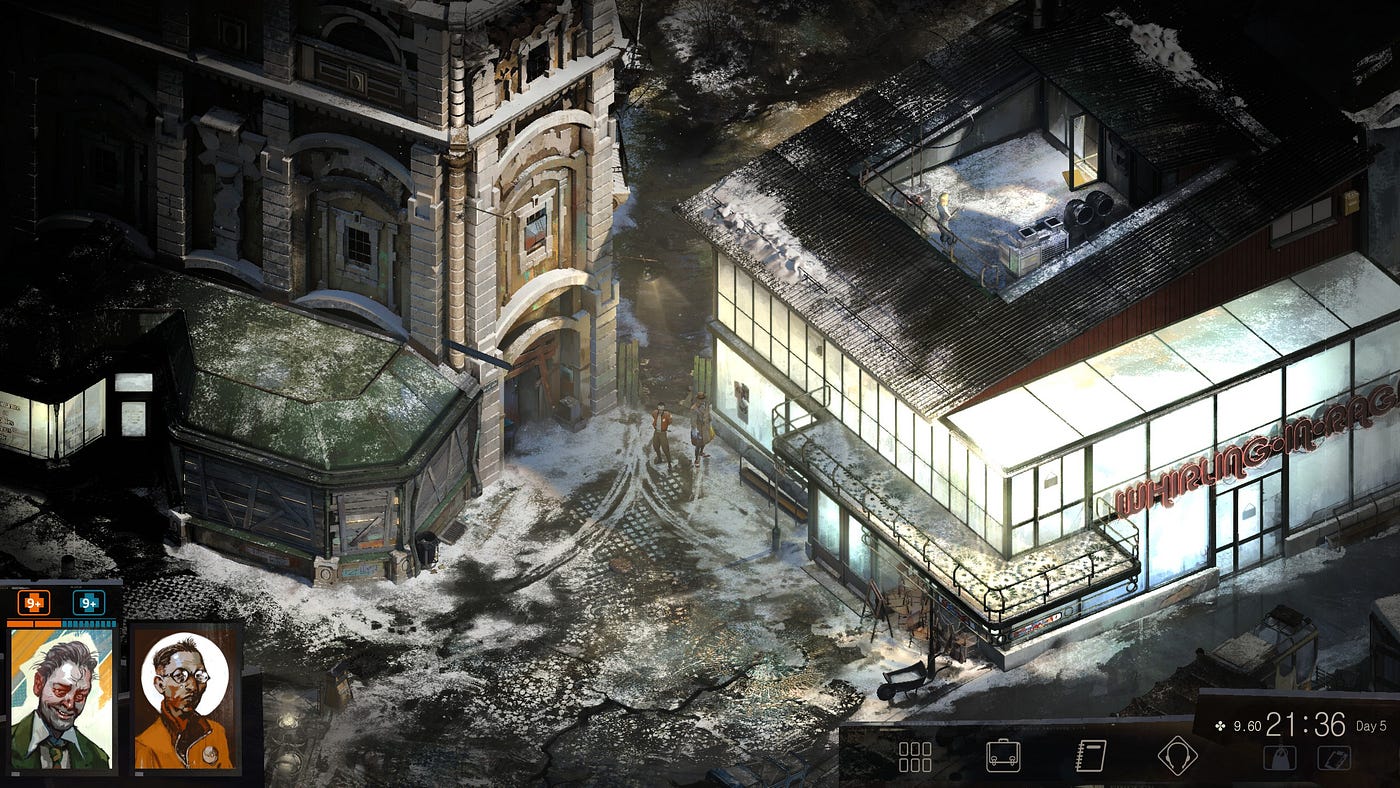
4. New Angel
“His face is turned toward the past. Where we perceive a chain of events, he sees one single catastrophe which keeps piling wreckage upon wreckage and hurls it in front of his feet. The angel would like to stay, awaken the dead, and make whole what has been smashed. But a storm is blowing from Paradise; it has got caught in his wings with such violence that the angel can no longer close them. The storm irresistibly propels him into the future to which his back is turned, while the pile of debris before him grows skyward. The storm is what we call progress.”
The passage is from German philosopher Walter Benjamin’s “Theses on the Philosophy of History,” a short essay from 1940. That same year, Benjamin, who was Jewish, fled Vichy France and died not long afterward.
As Stuart Jeffries details, the passage describes a painting by Paul Klee, which Benjamin hung in every apartment he ever lived in, “not quite as a guardian angel but a suggestive presence that would keep making appearances in his writings until [his] death.” The painting, “Angelus Novus,” has since become a leftist emblem.

Paul Klee’s “Angelus Novus,” an oil transfer with watercolor from 1920
Benjamin was a Marxist, but his most famous lines chip at the pedestal of historical materialism. Progress is messy and our faith in it blind, suggests Benjamin, who witnessed the failure of the November Revolution and the rise of Nazism. The end of capitalism may not be coming each day. We cannot know, as our only view is backward, into the storm. Our only option is to watch and wait. “Man kind [sic], be vigilant,” demand the credits of Disco Elysium, invoking the final written words of Julius Fučík, a Czech journalist and Communist Party member who was tortured and hanged by the Nazis. “We loved you.”
Decades after the deaths of Benjamin and Fučík, the political scientist Ronald Beiner writes:
“Historical materialism, under the influence of Hegel, is an effort to conceive history as rationally intelligible. But there is nothing of this conception in Benjamin’s “Theses.” For Benjamin, history is radically fragmented; the task of the angel of history is to establish a redemptive relation to the fragments.”
There is redemption in detective work, too. Solving a murder will never awaken the dead or make whole what has been smashed, yet we trust it redresses a wrong. Comprehension can change us. The resolution to a crime like “THE HANGED MAN” can help us see every lost life as a singular catastrophe. It should deepen our sympathy.
Now consider Harry’s redemptive work, which is also the player’s—retrieving his soiled paperwork, his drowned badge, his pawned gun. Sniffing discarded gum wrappers and dancing to outdated music. Fashioning the shards of his mind into a coherent, glittering whole.
One of the earliest tasks you can accept in Disco Elysium is to sing karaoke at the Whirling-in-Rags, downstairs from where you began your life again. Days later, you finally track down a working cassette of “The Smallest Church in Saint-Saëns,” the only song sad enough to convey the depths of your soul. You return to the hostel, mount the stage, and pass or fail a skill check. Either way, you sing these fateful lines, dredged from memory: “I have been so glad here/Looking forward to the past here.”
In this moment, the most Harry can hope for is a gentle reception, scattered applause. Perhaps reassurance from Kim, his partner. That doesn’t make this gesture at self-expression, at self-recovery, any less moving. Harry has been smashed to bits by the ruined love for his ex-girlfriend, Dora, by his drinking, by Revachol and this twilight of history. By the rising tide of present becoming past, becoming pale, until it swallows us.
H.D.B. cannot be remade as he was, yet he gets to his feet and goes back to work. He picks through the wreckage, his flotsam and jetsam. He tidies up, solves tasks, and seeks to understand. Somewhere along the way, he becomes someone or other new. Bearing witness to this process are the people of Martinaise, and a shadow in the reeds—and you, the kind player.
Down by the seaside, Harry Du Bois wakes up in a new life. Maybe there’s hope for the rest of us.
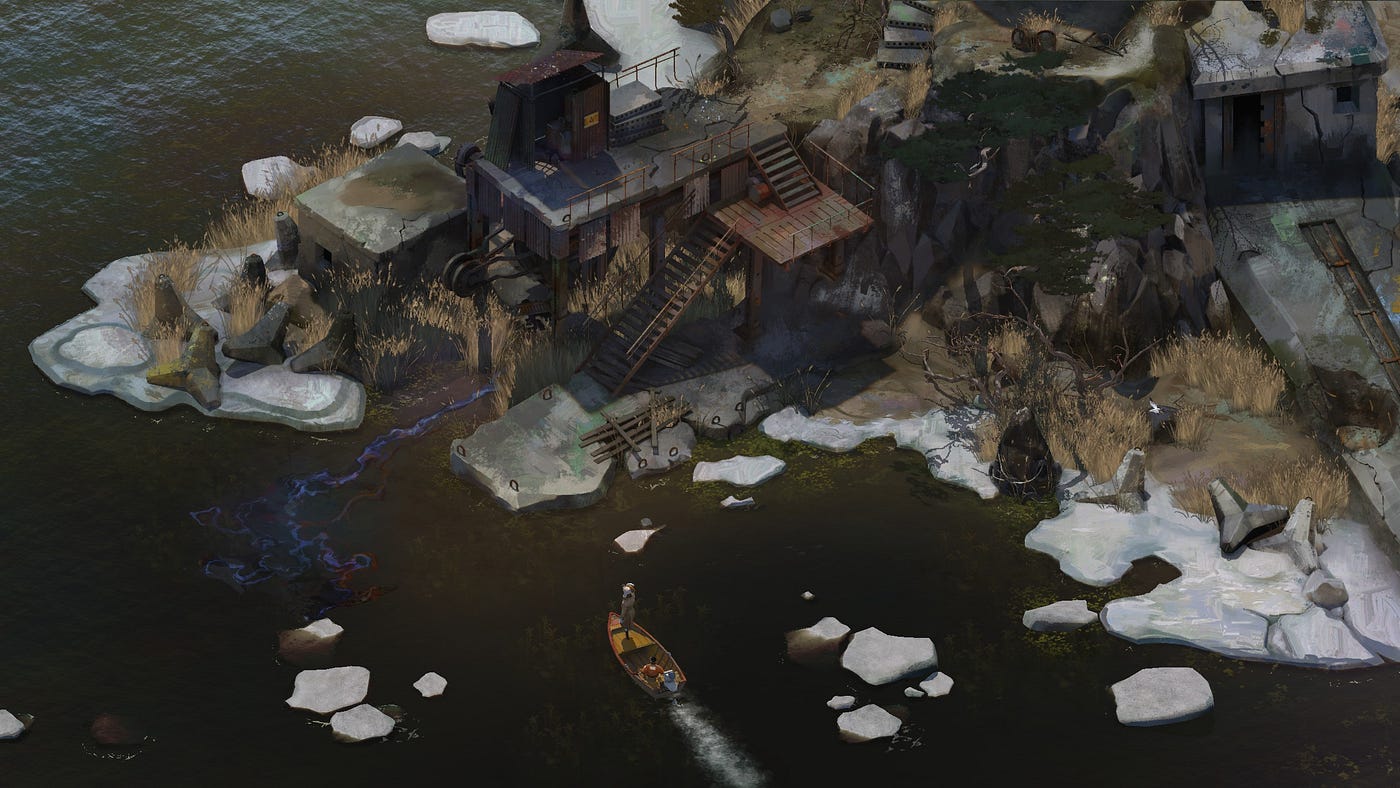

1. The White Flag
What should we make of our past?
The first embodied person we meet in Disco Elysium tells us she has overheard our character, Harry Du Bois, shrieking that he doesn’t “want to live as this kind of animal anymore.” The line is played for laughs, but there’s black ice underfoot. What kind of animal is Harry, anyway? A human. What is essential about humans, asks Disco Elysium—as compared to seagulls or giraffes or Insulindian phasmids?
Part of an answer might be that they can reflect on the past, write biography. And we know that humans are ideological creatures: we internalize theories of history and society, including scientific communism, Revacholian nationalism, and moralism (that is, radical centrism). Another answer is that humans are uniquely capable of abstract thought, of counterfactuals. We can look in the mirror and reconcile with—or reject—what we find there. We can imagine states of being other than our present.
What if we became a different kind of animal? Harry’s half-death and resurrection, which begins the game, is the fulfillment of that wish. He finds himself purged of biographical and ideological baggage, unmoored from memory and hurt. Briefly, he doesn’t even think. All it takes is a remarkable act of self-abnegation, hurried along by drink, drugs, and possible exposure to a hole in the world. “Total retrograde amnesia” may be a worn-out trope, but it’s a working stage door into the world of Elysium.
It’s also impossible to sustain. Our pasts selves aren’t just kept in our heads, after all; they can be detected in our environment and in others. Within moments of Harry’s mysterious rebirth, we’re on the case. We deduce that he’s trashed his hostel room. That he’s a reeking alcoholic, a mess. We can even confront his mirrored reflection—the “clearest water” of the game’s epigraph—and begin trying to comprehend or change what we find there. Once we leave the room, we learn that svelte and sympathetic Klaasje has met us before. Hers is the first of many dialogues that help us retrace our steps: H.D.B. is a police detective who loves disco music, it emerges. He breaks shit and howls in the night. Already, our new, rarefied form is being weighed down with stones out of the past.
Disco Elysium, like Planescape: Torment before it, delights in telling us about the damage our character did before we got there. The broken skua, the lost gun, the crashed motorcarriage . . . Harrier Du Bois has littered the district of Martinaise with clues to his former self. The player will inevitably start sifting through this wreckage, despite the warnings of Harry’s fractured mind—and especially of “Inland Empire,” the game’s most insightful and least practical skill.
But while we can uncover his past, we cannot change it. We have no choice in our character’s miserable biography. To escape the first room, we have to drag on Harry’s “piss-soaked, cum-stained party pants,” and we’re forever stuck in his rundown body. Everywhere we go, we learn of his ruinous past behavior—often to comic effect, always through a veil of guilt and sadness. The past is never finished with us, Disco Elysium says. We can’t drown it or pawn it or hurl it out the window. A human can be without their past only temporarily, like a beach before the tide rushes back.
There are still choices to be made in the present, though. “Life gets hard, but we go on,” as Klaasje sings. Like every CRPG before it, Disco Elysium contends that its player-character can improve with experience. Games are inherently optimistic this way: by accepting tasks and completing them, we tend to become more capable. There’s room to reshape ourselves, too; we can build ourselves better than the next cop, given time and effort and deliberation. That said, one of the game’s few middle fingers to the lineage of Dungeons & Dragons is its notion that a skill can be too developed; a detective can be too smart for their own good, too sensitive, too tough. And it’s noteworthy that almost all of the game’s Thought Cabinet projects and clothing bonuses come with debuffs and drawbacks, too. This world is complex, compromised.

Yet we can still be better than our beginnings. Robert Kurvitz, the game’s lead designer and writer, has said that Disco Elysium is about “reapplying for your job as a human being and as a cop.” This implies a test, a watching authority; someone or something will judge our fitness for both those roles. The reapplication process may prove grueling. Meanwhile, the past will return to us on every street corner in Martinaise. We will never get the drop on it or be done with it. We can only reassess our old choices and make better ones. In mechanical terms, this reduces to decisions about where to go, what to say, and how to think. Along the way, we tinker with Harry’s impulses and beliefs, and even introduce him to new concepts as we stumble across them.
At first, the game’s attitude to all this appears cynical. In the opening hours of Disco Elysium, Harry Du Bois is an ideological magpie, lining his nest with leftover scraps of political theory. His ideas are frail and worn-out things, and the game heaps derision upon them. Disco Elysium appears to have little time for hermetic ideology. Its political digs, early on, are things any Twitter user—or worse, any South Park viewer—might recognize. A drowning man may grasp at these straws, the game seems to scoff, but they won’t save him.
There’s real danger in this: by mocking communist and fascist impulses equally, the game risks sliding into a morass. Make no mistake, though: Disco Elysium is earnest and loving. Its heart, slowly revealed, pumps without irony. Also to its credit: it never permits its players an Archimedean point. Some of the game’s fiercest scorn is reserved for mealy-mouthed centrism or the “Boring Cop” who won’t commit. Neutral ground is still territory, this game knows, and there’s no safe vantage for laughter. As the hanged man tells us, there’s nothing funny about jokes.

But what is this place we’re policing? And what’s at stake? Just as Harry is waking up, his limbic system offers another theory of the human animal: we’re “evil apes dukin’ it out on a giant ball.” All we do is vie for resources, our brain laments; we have to beat the other apes or we lose. Is this Hobbesian vision true? The people we meet in Martinaise, their histories and hopes, should convince us otherwise. Even the Insulindian phasmid defers judgement on the flitting, open-hearted humans it has observed—despite its knowledge that they may be the cause of Elysium’s long, slow surrender to a phenomenon known as “the pale.”
By nudging Harry’s thoughts and actions, we can work toward refuting the limbic system’s paranoid assessment. Even in the game’s opening moments, we are given the option to think that the giant ball and its small, squabbling apes—this state of being—is sad, actually. We may not be able to alter Harry’s past, his human nature, but the individual player can choose how they feel about these things. A person could be more than an evil ape, we can argue. As Joyce Messier later remarks, “Even animals aren’t animals.”
And is this giant ball we share even a ball?
2. The Gorgeous Undertow
On the first night of his second life, Harry Du Bois dreams of the crime scene behind the Whirling-in-Rags. Within the dream, he can ask his hanged self a vital question: “What is Elysium?”
“Everything,” the Bloated Corpse of a Drunk replies. “The pale and the isolas … Burning, furious truth, eight thousand years of written history.”
We hear the same story about the world from Joyce, a member of the moneyed elite and the chief supplier of Harry’s “reality lowdown.” When pushed, Joyce reveals that Elysium may not be strictly spherical. A trickle of images from orbit suggest “a dark grey corona.” The pale, a featureless phenomenon that resists description, covers almost three-quarters of the world’s surface:
“There are grey flares and prominences, even arcs above entire isolas . . . The images are blurry, but if there was a sphere in there it certainly looks like it fractured a long time ago. . . . They say there is a rarefied envelope of matter surrounding the darkened disc of our planet. That is, if we are still living on a planet.”
The pale, it emerges, is an existential threat to the ecumene of Disco Elysium; it is growing, year by year, to swallow the known world and everyone in it. The isolas—little outposts of matter amid the pale, where humans dwell—are shrinking. There are perhaps three decades until everything that lives is pale and gone. Until then, humankind is but an “opportunistic microorganism” scattered across the pale, beaming its lights out into the void. Easier to picture Elysium as a disco ball than Carl Sagan’s blue dot.

So why is the wider world not panicked by this looming calamity? Everyone we meet in Martinaise seems defeated, hopelessly inured to the logic of late-stage capitalism. Shouldn’t the heaped corporate wealth be directed toward mitigation strategies, toward human survival? Why does the truth of the coming pale not “jolt us out of our rut,” as Joyce herself asks? No one knows.
One live debate, we are told, is between Elysium’s logical positivists—who believe the pale harms us through “extreme sensory deprivation”—and its dialectical materialists, who argue that the pale “somehow *consists* [sic] of past information . . . That it’s rarefied past, not rarefied matter.” Any humans exposed to it, on this view, become “over-radiated by past.”
What does this mean? Whom should we believe, and where does it leave us? Another kind of animal, the Insulindian phasmid, unpicks the thread at the game’s end, when we manage to communicate with it:
“[The pale] is a nervous shadow cast into the world by you, eating away at reality. A great, unnatural territory. Its advent coincides with the arrival of the human mind.”
The pale showed up when we did—in light of which, Kurvitz’s introduction to the setting becomes more pointed: “It has been there for as long as human beings have written down history.” The pale is a human creation, an excretion of the human animal. The phasmid tells us that no other species remembers it existing before we rose to supremacy. While Disco Elysium never offers a definitive account of the pale and its causes, you might call it the accumulated weight of our human past. Our tidal wave of history, rolling back to shore.
Is there any hope for us? Aesthetically, maybe. We can admire the collapse, furnish it. In the later parts of the game, the player can spend hours of their time on a series of interrelated tasks at an abandoned church, one of the “Seven Sisters” built by early settlers. These tasks have us convert the space into a nightclub for a new kind of dance music. The quest starts out feeling tangential, but it culminates in a series of discoveries that are thematically and emotionally vital.
Short version: there are multiple holes in the universe, 2 millimeters in size, and the Seven Sisters were built to house or contain them; these holes are related to the relentless production of pale; one of these holes may have factored into Harry’s amnesia; the “swallow” or un-sound produced by the holes proves an essential feature of Revachol’s emerging anodic (electronic) dance culture; and Harry can commune with the city by boogieing out of his mind. (Revachol beams him a warning. It tells him he is loved.)

Some of the game’s most staggering worldbuilding is staged in this little church; it is here we witness the synthesis of Elysium’s spiritual, scientific, artistic, and “para-natural” aspects. Note how Soona, the failed programmer, finally locates the 2mm hole: she surrounds it with its opposite, its antipode. She floods in loud, live, human music. And not just any music: noisy, urgent rave. Youth music. If there is too much past to bear, Disco Elysium seems to say, if the old world is leaking, plug it with the new.
Outside, the world is 72% pale, and the ratio is worsening. There is more and more of the stuff each day, growing skyward. A rising tide of past, crashing ceaselessly into our present, threatening to wash us away. Yet a beach still describes the ocean, even as it is consumed by it. And Harry Du Bois provides a living analog of this—its human proof. He cannot run from his past, but he can dance with it.
He can make something of it, with the player’s help.
3. Whodunnit?
Who killed the hanged man?
Disco Elysium calls itself “A Detective RPG,” and it offers big, heady swigs from classic detective media. Harry is the battered old cop obsessed with one last case; Kim is his faithful partner and confidante, the foil. Klaasje is the femme fatale out to save her own skin. And the city itself is a character—all evening shadows and icy breezes, littered clues and ticking clocks.
But the game also picks at the seams of old genre fiction, of the familiar. The world is surprisingly colorful and spirited, rich with culture. Martinaise may feels mournful, but it’s never a vise. And the corpse behind the Whirling-in-Rags isn’t the usual blonde angel of pulp—an unavailable object left to inspire the priapic male detective. Instead, it’s the scarred, rotting meat of a man who’s been dead for a week. It emerges that the body belongs to Ellis “Lely” Kortenaer, a strike-breaking mercenary who once reveled in the rape and pillage of far-off colonies.
Even animals like Lely deserve justice, holds Disco Elysium. And if not justice, our attention and care. The cops of the Revachol Citizens Militia (RCM) may be depicted as little more than overworked civil servants, but they’re not unmoved by their purpose. Corrupt and cynical, maybe, but not heartless. It’s a view of policing that may be jarring to anyone reared in a culture where cops are understood to be murderous enforcers of the status quo—and lionized in that role. But Revachol is a city in which violence, including state violence, is largely implicit. The police in Jamrock and Martinaise are neutered politically and carry impotent, muzzleloading firearms. The function of the RCM, Kim notes, is almost janitorial; they spend much of their time tidying up messes, ignoring minor offenses, and negotiating the peace.
All of which is essential to understanding the game’s view of police work: there is dignity in it — when it’s done with patience and empathy—but no heroism. Contrast this with conventional detective fiction, in which the identity of a corpse and its killer are reduced to intrinsically thrilling puzzles for a person of genius to solve. Most famous literary detectives eschew the political, emotional, and social aspects of a given crime, unless those aspects offer pertinent clues. Yet Harry and Kim are quick to relate to the citizens they police, because nothing would get done without their cooperation. Even the most bullying, reckless version of Harry Du Bois spends most of his time talking to people and trying, misguidedly, to help.

Other fictional detectives—Philip Marlowe, the Continental Op, Dick Mullen—serve as cleansing agents. They disinfect a given wound and restore the world to order, even if that order is lamentable. Harry Du Bois, by contrast, is an active contaminant, a man with no memory who queries everything, by necessity, and drags the whole world under his lens. Martinaise, all of it, becomes the object of his investigation. And while Harry’s methods are madcap, his curiosity is infectious; just ask Kim Kitsuragi. Or Kuuno de Ruyter.
“THE HANGED MAN,” as Lely’s murder is named in Harry’s ledger, is not the first or even principal mystery of Disco Elysium, but for many players it’s the main draw, and they are disappointed when Lely’s killer is revealed to be someone that Harry has never met. Iosef Lilianovich Dros, the elderly communist deserter who shot Lely prior to his hanging, doesn’t appear until the game’s denouement. This, many argue, is unfair to players doing their own detective work at home; it breaks the established rules of the genre. But what are those rules, exactly? And does Disco Elysium even give a shit?
Nearly a century ago, one version of the “rules” was enshrined by Ronald Knox, one of the authors of detective fiction’s so-called Golden Age. Knox’s first and cardinal rule affirms many players’ dislike for the ending of Disco Elysium: “The criminal must be someone mentioned in the early part of the story, but must not be anyone whose thoughts the reader has been allowed to follow.” If the criminal has never been in sight, the thinking goes, their unmasking won’t satisfy.
But what else does Knox demand?
“2. All supernatural or preternatural agencies are ruled out as a matter of course.”
Disco Elysium is stuffed with contrivances and unreal technology, but let’s stick to things that are weird even for the denizens of its world—and leave aside the pale and the 2-millimeter hole. The Deserter has hidden out for decades on various islands in the bay north of Martinaise, during which time he has suffered prolonged exposure to the “para-natural” Insulindian phasmid and the mind-altering camouflage it uses to avoid detection. This camouflage, the phasmid concedes sadly, has damaged Iosef’s mind and played its part in the murder.
“3. Not more than one secret room or passage is allowable.”
Count them: there’s the pinball museum in the Whirling-in-Rags; the hidden spaces beneath the Feld Building (including the communist bunker, itself a secret room within a secret passage); the inoperable door on Land’s End that would have brought Harry and Kim to the Sea Fortress; the Doomed Commercial Area lurking behind the bookshop’s curtain; the Dicemaker’s nest in the chimney (another space within a space); Cuno’s shack . . .
“4. No hitherto undiscovered poisons may be used, nor any appliance which will need a long scientific explanation at the end.”
As mentioned above, the phasmid unintentionally subjects the Deserter to an “undiscovered poison,” which Harry can sample (using a high-level Electrochemistry check) as one method for speaking with the creature. But think also of the radio device with which Ruby assaults Harry beneath the Feld Building, normally used to blast channels through the pale.
“5. No Chinaman must figure in the story.”
No, this list hasn’t aged well, even in conttext, and this item offers one of the most winking indicators that Disco Elysium knows the rules it’s breaking. Kim Kitsuragi isn’t a “Chinaman,” of course; he’s a Revacholian of seolite descent. But his centrality to the game’s story feels like a deliberate rebuttal of one of the tropes of Golden Age detective fiction. And if this seems too tenuous a connection, consider the racist “Chinaman” mug Harry finds discarded in the trash.

“6. No accident must ever help the detective, nor must he ever have an unaccountable intuition which proves to be right.”
The game delights in breaking this rule; there are simply too many instances to count. Disco Elysium is a storm of happy accidents and unaccountable intuitions, and two of its skills—Inland Empire and Shivers—are all but devoted to giving the player privileged information that later proves true.
“7. The detective must not himself commit the crime.”
This is one rule that goes unbroken. But let’s not forget that the game flirts with the possibility that Harry is a criminal and a killer: Ruby believes, mistakenly, that he is a “peone” for the gangster La Puta Madre, sent to execute her. And as a man without a past, he is also a man without an alibi, at least initially.
“8. The detective must not light on any clues which are not instantly produced for the inspection of the reader.”
Because of its dice-roll mechanics, Disco Elysium permits the player to “light upon”—and then immediately lose access to—important clues. For example, a failed check robs us of the flowers on Klaasje’s roof, the “May bells” that become one of the game’s most telling pieces of evidence. And Harry himself is full of clues not instantly produced; his mind only spits these up when prompted by a relevant situation or dialogue—or when a particular skill is emphasized. This is one respect in which a videogame with branching paths can be more compelling than a linear narrative: Disco Elysium allows us to miss things, or mistake them, or return to them later, and it offers varied routes to the same truth.
“9. The stupid friend of the detective, the Watson, must not conceal any thoughts which pass through his mind; his intelligence must be slightly, but very slightly, below that of the average reader.”
Kim Kitsuragi is far from stupid, and Cuno often shows quicker wits than Harry if he joins the latter for the game’s finale. Both companions routinely withhold their thinking from H.D.B. and the player. High levels of Esprit de Corps, Empathy, Composure, and other skills are required to access their inner states, which means some versions of Harry learn little of what goes through Kim’s or Cuno’s minds.
“10. Twin brothers, and doubles generally, must not appear unless we have been duly prepared for them.”
Edgar and Evrart Claire are (almost) identical twin brothers. Lilienne from the fishing village is mother to twin sons, whom Harry cannot tell apart. And while Ellis and Raul Kortenaer aren’t blood relatives, they grew up together and share the surname given to them by their foster family. Raul’s identity and connection to Lely can remain hidden until the tribunal, if the player does not gain the trust of both Joyce and Klaasje.
There’s a mound of evidence that Disco Elysium goes out of its way to violate Knox’s commandments at every possible opportunity. Its assault on the rules of detective fiction is knowing and deliberate. But what’s the point? Why attack a set of principles designed to produce a pleasing narrative?
Remember that the game has already shown contempt for the tidiness of ideology; it distrusts any rigid frame for viewing or creating the world. Knox’s rules are one such frame, and they don’t jive with the postmodern tradition Disco Elyisum inhabits. Postmodernism asks us to be skeptical about grand narratives, about any “explicable” chain of events that can be traced back—link by link, clue by clue—to a single cause. Knox and his contemporaries lived in a time of prevailing modernism, and they idealized self-contained puzzles that would please the enlightened mind. Disco Elysium, by contrast, depicts a world like our own, dizzying and fractured, in which we are unsure of our ability to make the pieces cohere. Accordingly, it treats the “rules” of genre fiction as artificial, stultifying, and dishonest.

Raymond Chandler might have agreed. In the postwar period, he drafted a new set of commandments for the detective story, and Disco Elyisum hews better to these (except, perhaps, for No. 8: “It must not try to do everything at once.”). In 1950, Chandler dismantled the fussier, rule-following tradition of detective fiction in an essay called “The Simple Art of Murder.” It’s worth reading in its entirety, but here’s a relevant excerpt:
“There is a very simple statement to be made about [Golden Age detective] stories: they do not really come off intellectually as problems, and they do not come off artistically as fiction. They are too contrived, and too little aware of what goes on in the world. They try to be honest, but honesty is an art.”
Disco Elysium is acutely concerned with “what goes on in the world”—and with being radically honest about it. On this view, it is far less important that the player is able to recognize the murderer from the opening moments of the game, and much more important that the murder dramatizes true things about Elysium, about Martinaise. This theme is taken up at much greater length in PJ Judge’s piece, “A Spectre Is Haunting Martinaise.” Of particular note is this quoted passage, from Paul Grimstad’s What Makes Detective Fiction Great:
“At the end of his 1944 essay, Edmund Wilson suggested that it was no accident that the Golden Age of detection coincided with the period between the two World Wars: in a shattered civilization, there was something reassuring about the detective’s ability to link up all the broken fragments and “know just where to fix the guilt.” Such tidy solutions were to Wilson the mark of glib and simplistic genre fiction. But to [T.S.] Eliot, who in “The Waste Land” wrote of the fractured modern world as a ‘heap of broken images,’ it seems possible that Golden Age detective stories offered above all a pleasing orderliness—a way of seeing ghastly disruptions restored to equilibrium with the soothing predictability of ritual.”
Disco Elysium offers no “soothing predictability,” and neither is it glib. Its fractured world, so like our own, is not the setting for a mystery; it’s the subject of it. “Who killed the hanged man?” isn’t the question at stake. It’s the prompt for a broader investigation into what has fractured Martinaise—and fractured it irreparably, such that it cannot be made whole.
On this view, the game becomes what Harry Du Bois calls a “stereo-investigation,” a meta-inquiry into the world and his state of being. The game jokes about Harry treating everything as a puzzle worthy of investigation . . . but there’s nothing funny about jokes. Think of all H.D.B.’s diversions, his side tasks. Where is his paperwork, his badge, his other shoe? What’s behind the blue door in the Whirling-in-Rags? What’s behind the curtain in the bookshop? Who put the racist mug in the trash? Where is the victim’s missing armor? What’s the significance of these strange white flowers? And those are just the smaller ones. Go wider: what shuttered the businesses in Martinaise’s doomed commercial area? What has become of a working-class woman’s missing husband? What ruined the ambitions of a “radiogame” company and led Soona to the church? Is there a mythical cryptid lurking in the reeds?
Kim is skeptical about the importance of many of these questions, but Harry is always proved right that they are relevant or consequential. Even his zaniest tasks turn out to be fruitful, and his journal never imposes a hierarchy or scheme upon them (unlike more traditional RPGs), beyond noting the day they were begun. Every task in Disco Elysium belongs to a singular mystery, it emerges. The case of the amnesiac detective. The case of Martinaise’s neglect. The case of the failed Revolution.
Okay, but who killed the hanged man?
A nobody we never met. Case closed?
Look around: the environment is littered with clues. Outside the Whirling-in-Rags, the terrain itself is ruptured. An unrepentant royalist plays pétanque in a crater, never filled. The scenery is studded with bullet holes, never patched, and Harry, with ironic naivety, wonders if they’re evidence of something. We tour a bombed-out apartment block with pricey ocean views, or we peer through a coin-operated viewer and spot the Deserter’s sunken fortress. Everywhere, Martinaise has failed to resolve its crisis: at the center of the harbor’s traffic jam, a monarchist statue has been restored, by goofing artists, to a half-exploded state. One of the game’s most mournful scenes has Harry visually reconstruct a long-forgotten firing line. Who was doing the shooting is unclear, but Kim suggests it was Coalition troops, who are always the last ones standing. The forces of foreign capital, swooping in to claim their morsel.

From the opening moments of Disco Elysium, we are repeatedly shown that Martinaise is a wound that won’t heal. Home to drunks and dockworkers, the district has never been absorbed into the wider city, and all attempts to gentrify it have failed. The RCM squabbles over who won’t have to police its streets; the Wild Pines Group needs the place only for its harbor. Everything about Martinaise is wrecked and haunted and wanting. Waiting for a resolution that never came. The bullet that lands in Lely’s mouth arrives decades late.
(During the initial autopsy, Inland Empire allows you to ask the hanged man what killed him. “Communism,” he replies, and we dismiss it. It’s a silly answer. Reductive, unhelpful. It’s also not wrong.)
Disco Elysium is a game in mourning—not for lifeless “scientific communism,” but for the Revachol commune, for what it represented and might have been. For what it was not allowed to be. The grave markers are everywhere, and they leak into Harry’s mind. He can mistake himself for Kraz Mazov, the game’s version of Karl Marx, or convince himself that Mazov never died. He can tangle the feminine spirit of “girl child Revolution” with his own lost love for Dora, an ex-girlfriend who left him six years ago, and whom he’s never gotten over.
In Harry’s addled mind, this isn’t a trite comparison; the Revolution and Dora were both opportunities for hope—joyous uprisings—but they’re gone now, into history. In spite of this, he can’t help sorting through the wreckage. Harry puts a hole in his own head, and still memory comes flooding back.
What makes H.D.B. remarkable, in the player’s hands, is that he still gets up and does his job. He starts afresh. He bears the weight of his past.
Compare him with the members of the game’s twisted love triangle: the Hanged Man, Miss Oranje Disco Dancer, and the Deserter. Those aren’t their real names, but they’re no longer real people. They’re revenants, walking corpses. All three gave their youth to some form of service to state or capital, and it damaged them irreparably. Iosef poured himself into his Revolution; Klaasje and Lely have done heinous things on behalf of the banking sector and their shared country of origin. None of the three can escape what they have done, or continue to do, in the name of ideology.
Lely is a brutish husk who depends on blood money. His only purpose is to inflict order on Martinaise, to “civilize” it as he has civilized Oranje’s colonies. Even a bullet to the head can’t free him from his armor, his layered shell: the bitter spring temperatures preserve his flesh long after death, and Harry can conjure his spirit and speak with it. While Disco Elysium shows a measure of sympathy for the dead colonel—and for the other members of his squad, whom it treats as the damaged claws of capital—it is clear-eyed about how their lives must end. There is no escaping such carnage.
Klaasje, too, cannot outrun her past, even as she tries out new names, new drugs, new sexual partners to cover over her espionage. Martinaise is the end of the road for her, she admits. There is no place her old employers won’t find her. Yet she clings to life out of habit, flees out of habit, smokes and fucks and lies out of habit. Those impulses define her; she can’t make new ones. She is sorry for what she has done, she maintains, yet she knows that isn’t good enough. Her history towers over her, and she can only linger in its shadow, feigning a shrug.
And there’s the Deserter, stranded in the past. He cannot forgive anyone for the failure of the Revolution, least of all himself. He fashions his scrapheap of ideology into ironclad righteousness, all to sustain a pretend guerrilla war—though its casualties, plural, are real. If his vigil ends, the Deserter thinks, so will the future. Yet the future has already been lost. The game invites us to compare Iosef with the right-wing monarchist, Rene: both are furious old men clinging to outmoded politics, to ideals capitalism has dispensed with and stripped for parts. Both refuse to abandon their posts . . . yet no one notices. They might have been friends, it is implied, if they could have recognized each other’s personhood.
Instead, the Deserter sees himself in Klaasje. He spies her arriving in Martinaise and hiding her documents. For a brief moment, he thinks of her as a kindred spirit who has seen the mask of capital slip, as he has. He is bewitched by her solitary flight into Revachol, even as he loathes her for what she represents—and for her sexual embrace of Lely. He murders the latter not just for what he is—a deformed golem—but for what Lely can share with Klaasje, whom Iosef cannot have. She is simply too far away for him to reach, in distance and time and ideology.
The task of the detective, on the conventional view, is to point out an evil and cleanse it. If we can identify “whodunnit,” we can punish the culprit and make things right. But there is nothing to be done with Iosef, an angry old man who murdered a stunted ogre on behalf of a sad and unavailable woman. Disco Elysium cares about all three of them as people, but it’s not clear things could have gone otherwise.
History wouldn’t allow it.
Let’s be honest: the simple fact of the Deserter’s identity isn’t valued in the story of Martinaise, and neither is the player’s vanity in deducing it. This place was shattered decades earlier, and the Deserter’s act is just one more sad beat of its dying heart. Lely’s murder isn’t a mystery to be solved; it’s a tragedy to be understood—and mourned. It deserves as much consideration as the death of the working-class drunk who slipped and died on the boardwalk. Which is to say, all the consideration we can muster.
That’s Harry’s job, in the end, and ours. To stare into the past and ask what happened. To determine how we should feel about it. Because of his amnesia, H.D.B. is the only person in Martinaise who can approach the world anew, encounter it with fresh eyes. The world is radically available to him; he can pick up any of its pieces and begin rebuilding communism, or spouting fascism, or affirming the “ultraliberal” hustle. If we choose, he can even pursue a ragged, loving humanism.

Yet Disco Elysium treats ideology as a form of dementia: Joyce jokes about the pandemic that provided the material conditions for the Revolution, and if we play Harry as a devout Revacholian nationalist, all but two minor characters will treat his outbursts as they would a madman’s. Mechanically, the game treats fascism as a kind of psychological self-harm: it hurts our morale to pursue it. That’s a wishful indulgence, perhaps, similar to Kurvitz’s declaration that slavery has never existed in this world; even Disco Elysium, a radically honest project, is not without its evasions. But the game is bluntly truthful about a society, like ours, where capitalism has won an almost total victory, and in doing so “ended history.” Capitalist logic is unassailable, if we forget the encroaching pale.
It’s sad to admit, but even Harry’s leftist politics are flimsy. They don’t stand up to scrutiny, let alone the prevailing world order. They also don’t factor much into how Disco Elysium proceeds or how it ends. Regardless of our approach, we bear witness to a more or less inevitable conclusion, with relatively little variety, give or take a few deaths. It remains for us to decide how we feel about it.
Because of this, some critics have called the game a visual novel or a “Choose Your Own Adventure” book. They complain about how it “railroads” the player to the same location, the same revelations, the same lurking phasmid. But that’s exquisitely the point: we are forever steeped in history, drowning in it, carried on its tides. Martinaise is bound to failure, Lely to his bullet, and the Deserter to the island, his rifle, and an impossible dream.
The past is never behind us, on Elysium or on Earth; it keeps returning to haunt us. Knowing this, what can we do?
That is the insoluble mystery at the game’s heart. Our singular, sprawling task is to make sense of Martinaise entire. To gorge on the thing and hope to understand it. One playthrough can’t accomplish that. Several won’t. There will always be an unvoiced thought or recollection, a dice roll that lets us down. But the effort is the thing. The loving attempt to comprehend the past, reckon with it—and await the future.
If there is a single image that haunts Disco Elysium, it’s Klaasje’s nightly vigil on the roof of the Whirling-in-Rags, smoking her cigarettes with her back turned. Her back turned. Only later, if she is allowed to flee, does the player discover that Klaasje has long since traced the killing shot. She has determined it came from far behind her, from the island. While she never learns the Deserter’s identity, she is sure of his intent. Through the long-range scope of his rifle, Iosef has seen her staring back at him.
Yet Klaasje waits up on that roof every night, frozen in a square of light, inviting a second bullet. She stands with her back to the future, looking into the room where Lely was shot. Into history.

4. New Angel
“His face is turned toward the past. Where we perceive a chain of events, he sees one single catastrophe which keeps piling wreckage upon wreckage and hurls it in front of his feet. The angel would like to stay, awaken the dead, and make whole what has been smashed. But a storm is blowing from Paradise; it has got caught in his wings with such violence that the angel can no longer close them. The storm irresistibly propels him into the future to which his back is turned, while the pile of debris before him grows skyward. The storm is what we call progress.”
The passage is from German philosopher Walter Benjamin’s “Theses on the Philosophy of History,” a short essay from 1940. That same year, Benjamin, who was Jewish, fled Vichy France and died not long afterward.
As Stuart Jeffries details, the passage describes a painting by Paul Klee, which Benjamin hung in every apartment he ever lived in, “not quite as a guardian angel but a suggestive presence that would keep making appearances in his writings until [his] death.” The painting, “Angelus Novus,” has since become a leftist emblem.

Paul Klee’s “Angelus Novus,” an oil transfer with watercolor from 1920
Benjamin was a Marxist, but his most famous lines chip at the pedestal of historical materialism. Progress is messy and our faith in it blind, suggests Benjamin, who witnessed the failure of the November Revolution and the rise of Nazism. The end of capitalism may not be coming each day. We cannot know, as our only view is backward, into the storm. Our only option is to watch and wait. “Man kind [sic], be vigilant,” demand the credits of Disco Elysium, invoking the final written words of Julius Fučík, a Czech journalist and Communist Party member who was tortured and hanged by the Nazis. “We loved you.”
Decades after the deaths of Benjamin and Fučík, the political scientist Ronald Beiner writes:
“Historical materialism, under the influence of Hegel, is an effort to conceive history as rationally intelligible. But there is nothing of this conception in Benjamin’s “Theses.” For Benjamin, history is radically fragmented; the task of the angel of history is to establish a redemptive relation to the fragments.”
There is redemption in detective work, too. Solving a murder will never awaken the dead or make whole what has been smashed, yet we trust it redresses a wrong. Comprehension can change us. The resolution to a crime like “THE HANGED MAN” can help us see every lost life as a singular catastrophe. It should deepen our sympathy.
Now consider Harry’s redemptive work, which is also the player’s—retrieving his soiled paperwork, his drowned badge, his pawned gun. Sniffing discarded gum wrappers and dancing to outdated music. Fashioning the shards of his mind into a coherent, glittering whole.
One of the earliest tasks you can accept in Disco Elysium is to sing karaoke at the Whirling-in-Rags, downstairs from where you began your life again. Days later, you finally track down a working cassette of “The Smallest Church in Saint-Saëns,” the only song sad enough to convey the depths of your soul. You return to the hostel, mount the stage, and pass or fail a skill check. Either way, you sing these fateful lines, dredged from memory: “I have been so glad here/Looking forward to the past here.”
In this moment, the most Harry can hope for is a gentle reception, scattered applause. Perhaps reassurance from Kim, his partner. That doesn’t make this gesture at self-expression, at self-recovery, any less moving. Harry has been smashed to bits by the ruined love for his ex-girlfriend, Dora, by his drinking, by Revachol and this twilight of history. By the rising tide of present becoming past, becoming pale, until it swallows us.
H.D.B. cannot be remade as he was, yet he gets to his feet and goes back to work. He picks through the wreckage, his flotsam and jetsam. He tidies up, solves tasks, and seeks to understand. Somewhere along the way, he becomes someone or other new. Bearing witness to this process are the people of Martinaise, and a shadow in the reeds—and you, the kind player.
Down by the seaside, Harry Du Bois wakes up in a new life. Maybe there’s hope for the rest of us.

Is the full text quoted somewhere in the thread? I don't want us to lose it when their hosting expires one day because they spent their McDonalds salaries on vinyls :D
This also reminds me I should try to finish my review.
This also reminds me I should try to finish my review.
rusty_shackleford
Arcane
- Joined
- Jan 14, 2018
- Messages
- 50,754

weird, it didn't even change genresDE as a P&C adventure
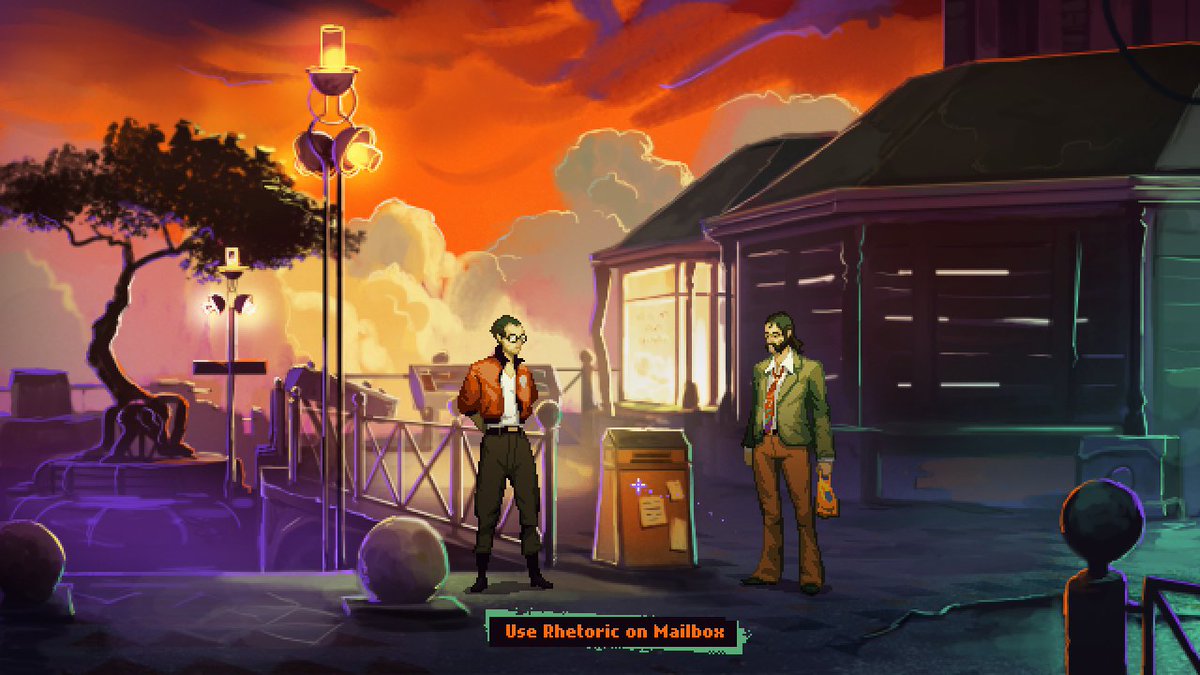
genre is all about perspective, you seeweird, it didn't even change genresDE as a P&C adventure

Disco Elysium is RPG.
fantadomat
Arcane



Why read that shit when you could just play and enjoy the game
Why be literate when we could just enjoy life?
- Joined
- Jan 28, 2011
- Messages
- 99,677















https://store.steampowered.com/news/app/632470/view/3121564363626730602
The Final Cut Anniversary!
65% off to celebrate!
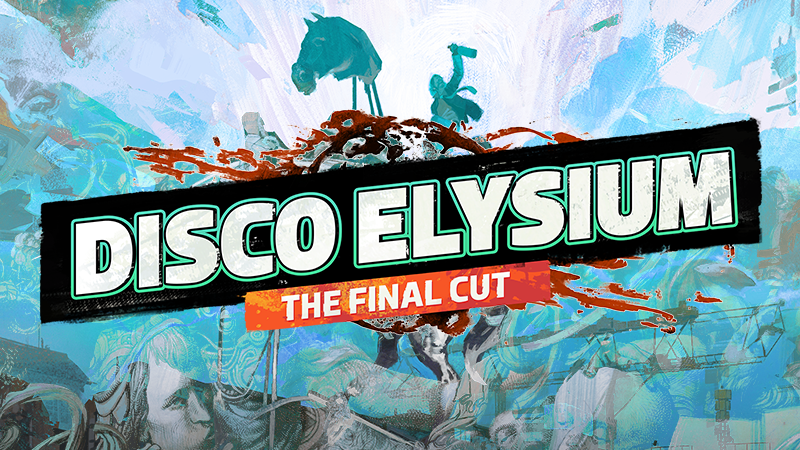
Disco Elysium - The Final Cut has its first anniversary today so we’re celebrating with a huge discount. Get the full game right now with all its bell bottoms and whistle blowers with a whopping 65% off until April 4. Tell all your friends.
An anniversary like this is as good a time as any for a party. And what do you need at a party? Games! So let’s play one: Can you remember everything we added to Disco Elysium with The Final Cut?
Alright, don’t panic, we know it’s a long list. Here are most of the things we added to the game a whole year ago:
Have you played The Final Cut and think you found everything? Well, think again as we added a bunch more secrets into the game in late 2021 with the Jamais Vu Update. Naughty of us, we know, but we wanted to say thanks to all of our brilliant fans.
- Full voice acting (English)
- New political vision quests
- New characters
- New clothes
- New area
- New cutscenes
- New animations
- New music
- New achievements
- Controller support
- Improved playability
Is that everything? Oh, not quite. The ZA/UM Atelier also celebrated its first birthday last week and had a full restock of its catalogue of Disco Elysium-inspired clothes.
Best go and browse the store right now in case there’s something you’ve wanted to pick up and haven’t had the chance yet – like, how about one of our esteemed art prints?
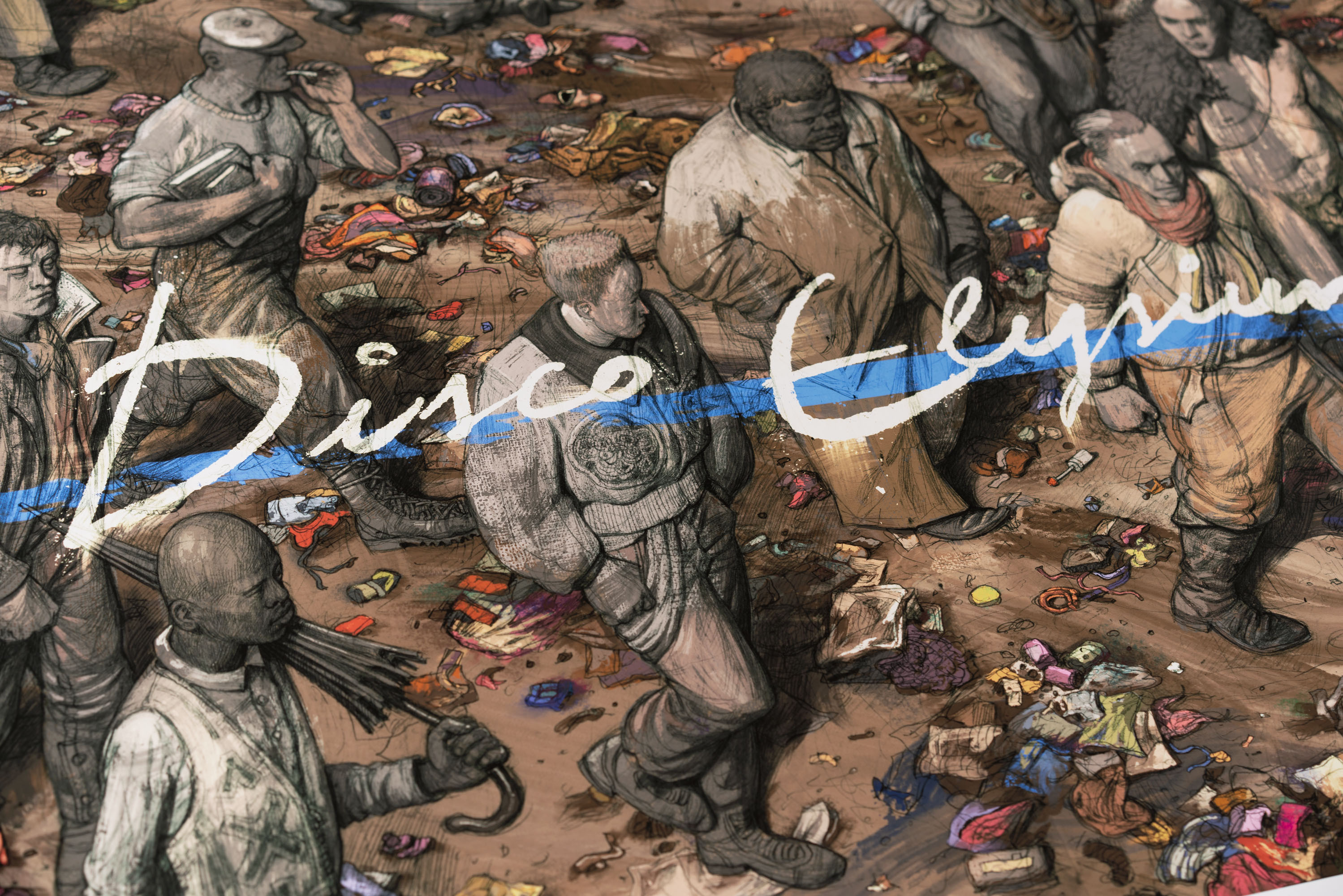
Alright, that’s all, friends. Ars longa, vita brevis.
All our love,
zaum
Disco Elysium Patch notes for version 2a92c13c (viewable in the F1/Help menu, bottom right)
Take care and stay safe folks! Remember to report bugs here.
- Fixed savegame name creation (no longer confusing!).
- Fixed molotov cocktail throw.
- Fixed audio when running the generator.
- Blast doors no longer open randomly.
- Updated end credits -- a good reason to get a different ending!
- Fixed an NPC who kept showing up too late on screen. Clearly, they had better things to do...
- Fixed general audio bugs in backyard.
- Attention Puller circle on Paralyzer orbs is now properly hidden. Really.
- Huge pile of optimisations for faster loading and a smoother Disco experience.
KeighnMcDeath
RPG Codex Boomer
- Joined
- Nov 23, 2016
- Messages
- 15,463
Do I own this game? Or CP2077? Fuck if i remember. I know i didn't buy gamedec yet. Plan on it eventually.








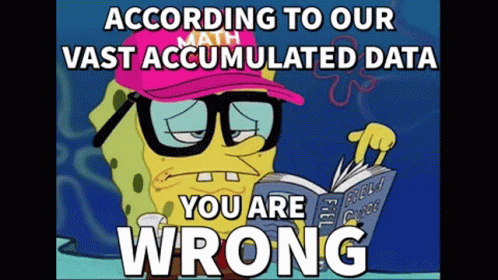






![The Year of Incline [2014] Codex 2014](/forums/smiles/campaign_tags/campaign_incline2014.png)






